The ruins are shooting point blank. Execution of partisans
Belarusian-Jewish "confrontation": why is Minsk objectionable to Masha Bruskina?
Abram TORPUSMAN, Jerusalem
Execution of Maria Bruskina. Photo from the archives of the Wehrmacht
FIRST DOCUMENT - FROM THE MINISTRY OF CULTURE OF BELARUS
In accordance with the instruction of the Presidential Administration of the Republic of Belarus dated November 24, 2015 No. 28 / 8-1831, the Ministry of Culture has considered your appeal with the attached text of the letter of the scientific editor of the Electronic Jewish Encyclopedia A. Torpusman addressed to the President of the Republic of Belarus A. Lukashenko.
On the merits of the issues raised in the letter, we report the following.
We believe that the main reason the long-term "confrontation" between the authors of the appeals and a number of Belarusian historians is the presence of several versions of the name of the executed girl and the absence of serious documentary evidence in favor of her recognition as Maria Bruskina.
The bottom line is as follows. August 11, 1944 in the newspaper " TVNZ"two photographs were published, discovered, as stated in the accompanying text, Soviet soldiers during the liberation of Minsk. The photographs captured the execution by hanging of unknown patriots - men, boys and girls.
At the beginning of 1946, a version of the same photographs was transferred to the museum from Poland, and then from different sources (from Moscow, Kaunas, Odessa, etc.) new photographs began to arrive, including other executions that took place in Minsk on the same day, October 26, 1941 Gradually a series of events developed from them, which made it possible to recreate the picture of this tragic day, during which the Nazis were publicly executed in different districts of the city (on K. Marx Street, in the park opposite the House of Officers, on Voroshilov Street ( now Oktyabrskaya) and on Komarovka) 12 underground workers and Soviet prisoners of war, whom the patriots tried to save from the concentration camp.
Soon after the war, relatives, acquaintances, and underground comrades identified eight victims in the photographs, including the leaders of the underground group Kirill Ivanovich Trus and Olga Fedorovna Shcherbatsevich, the son of Olga Fedorovna, schoolboy Vladlen Shcherbatsevich.
Three men remained unrecognized, as well as a girl who died together with K. Trus and V. Shcherbatsevich at the entrance of a yeast factory on Voroshilov Street (now Oktyabrskaya).
Extraordinary plots of the tragedy reflected in the photographs attracted the attention of scientists and the public. Since the end of the 40s of the XX century, they have been reproduced countless times in print, included in almost all fundamental publications on military history used in documentaries... From 1946 to the present, they have been exhibited in the museum.
After the publication in 1961 of the second volume of "The History of the Great Patriotic War", in which one of the photographs was placed, the first version of the name of the executed girl appeared. A resident of Zhdanov (now Mariupol, Ukraine) N.K.Sharlai and her mother identified in the photograph their sister and daughter Tamara Kondratyevna Gorobets - a clerk of the headquarters of one of the military units, who disappeared in 1941 photographs, photographs of the execution of an unknown girl were examined in Minsk, in the scientific and technical department of the Ministry of Internal Affairs of the BSSR. As a result, a coincidence was found on six grounds: the shape of the face, the height of the forehead, the height of the nose, the size of the mouth, the position of the corners of the mouth, the shape of the chin. Some differences were only in the shape of the eyebrows and the height of the chin, which did not allow the expert to unambiguously answer the request regarding T. Gorobets. The expert opinion is kept in the National Archives of the Republic of Belarus (F. 4386, on. 1, d. 29, l. 16). Nevertheless, the version about T. Gorobets has a right to exist. She is supported by the available evidence that the executed girl was not a Minsker.
In general, very few documentary sources have survived about the emergence of the anti-fascist underground in Minsk in the summer of 1941. T. Gorobets could be among the staff of one of the hospitals for Soviet prisoners of war in Minsk, carry out work there to save people, while in contact with the underground group of K. Trus - O. Shcherbatsevich.
The second version of the name of the deceased girl appeared in 1968, and simultaneously in Moscow and Minsk. Moscow journalists L. Arkadiev, A. Dikhtyar and A. Vergelis, together with V. Freidin, an employee of the newspaper Vecherniy Minsk, unexpectedly quickly came to the unambiguous conclusion that the executed girl is a graduate of the former 28th Minsk school M.B. Bruskin (pictured).
Employees of the Party archive of the Institute of Party History under the Central Committee of the Communist Party of Belarus (now the National Archives of the Republic of Belarus), where all the materials on the Minsk anti-fascist underground were concentrated, immediately raised the relevant documents, but no traces of M. Bruskina's underground activities were found. It was established that the materials hastily collected by the journalists were based on secondary testimonies of people who had nothing to do with the activities of the underground (relatives, acquaintances of M. Bruskina, who "identified" her only 20 years after the pictures of the execution became widely known).
Nevertheless, these materials were replicated in the mass media of the Soviet Union and a number of foreign countries.
In 1971-1972. on the instructions of government bodies, the painstaking work of establishing the name of the executed girl was done by employees of the 4th department of the 2nd department of the KGB of the BSSR, the archives of the KGB of the BSSR and the Institute of Party History under the Central Committee of the Communist Party of Belarus (at that time, the latter contained all documents on the history of the Minsk underground), the museum ... The criminal cases of the punishers who carried out the execution, the traitor Rudzianko, the former prison guard Samokhvalova, were thoroughly studied. Identified and questioned persons who were part of the group O. Shcherbatsevich - K. Trusa, who provided her assistance or simply knew about the activities of the patriots. The surviving former servicemen of the 5th Rifle Corps, who in 1941 were wounded in the infirmary in the building of the Polytechnic Institute, were also interviewed. In no case was the name of M. Bruskina found.
At the same time, in the course of this search, new versions of the identity of the deceased girl appeared. According to the testimony of one of the former prisoners of the prison, who was in the same cell with an unknown, as well as the warden of the prison, the girl who called herself Anna was 22-24 years old, had the specialty of a nurse and experience in this profession and, what is important, did not know Minsk at all , because she was a native of the central regions of Russia.
As a result of these studies, experts from the Ministry of Internal Affairs and the KGB, historians, concluded that it was she who was the executed girl: nurse Anna, who worked in the field hospital of the 5th rifle corps, presumably a native of the Moscow region. It was not possible to collect more detailed information about her.
In addition, witnesses persistently spoke about the blonde girl far from school age... The fact that it was not yesterday's schoolgirl (and Masha Bruskina graduated in June 1941 high school), is clearly visible in all available photographs of the execution.
The next stage of the study of the issue dates back to 1987. During this period, a qualified commission was created from specialists from the Institute of Party History under the Central Committee of the Communist Party of Belarus, the Institute of History of the Academy of Sciences of the BSSR and the Museum. The commission again carefully examined the archival documents of the Institute of Party History, the KGB of the BSSR and the KGB of the Lithuanian SSR (since the Lithuanian police battalion took part in the execution), materials from the Museum's funds. Dozens of participants in the underground struggle and eyewitnesses of the events were again interviewed. As a result, the version about Masha Bruskina was not confirmed again.
Based on the results of the commission's work, a detailed information was drawn up and on the basis of the materials collected by the members of the commission A.M. Litvin and M.F.Shumeiko an article was prepared, which in April 1988 was published in the newspapers "Zvyazda" and "Vecherniy Minsk".
The fact of the actual existence of a girl named Masha Bruskina - a Minsk woman, a graduate of the 28th secondary school, was beyond doubt. However, the commission again did not find documented data on the participation of M. Bruskina in the activities of the Minsk underground, on her connections with K. Trus's group - O. Shcherbatsevich or with the underground in the Jewish ghetto, where the girl could enter because of her nationality. Her name was not mentioned either in the numerous memoirs of underground workers, including those of the Minsk ghetto, written immediately after the war, that is, on the "hot" trail of events, and later (50-60s of the XX century).
As for the identification of the photographs of the executed girl with the only surviving, heavily retouched image of M. Bruskina, published in the newspaper "Pianer Belarusi") dated December 17, 1938, the forensic research department of the Ministry of Internal Affairs of the BSSR did not reveal a set of necessary identification signs of appearance.
Stages research work on the topic 1971-1972 and 1987 are reflected in the new fundamental joint work of leading Russian, Belarusian and Ukrainian military historians "1941. A country on fire" (published in 2011 in Moscow under the editorship of Academicians A.O. Chubaryan, V.A. , A.A. Kovaleni).
In connection with the above, the name of M. Bruskina was not mentioned on the memorial plaques installed in 1976 and 1996 in memory of the underground workers and prisoners of war executed on October 26, 1941 (in the Central Park, on the building of the Minsk Yeast Plant on Oktyabrskaya Street and on the building Ordzhonikidze Plant on V. Horuzhei Street), as well as in photographs of the execution in the exposition of the Belarusian State Museum of the History of the Great Patriotic War.
In the 1980s, another version of the name of the girl executed by the Nazis appeared. A resident of the village of Novye Zelenki, Chervensky District, having seen a photograph of the executed in the museum, identified her as her relative, Alexandra Vasilievna Linevich. The Museum staff, together with a senior researcher at the Institute of History of the Academy of Sciences of the BSSR, candidate of historical sciences, a war veteran KI Domorad, who had been studying the Minsk underground for many years, went to the indicated village to interview witnesses. All of them unanimously asserted that the photographs depicted their fellow villager A. Linevich, who had moved to Minsk shortly before the war. They learned about her execution in the village back in January 1942. It is no coincidence that the name of the girl on the local monument is on a par with the names of other heroically perished fellow countrymen. Moreover, the villagers, according to them, did not even imagine that somewhere the girl was still considered unknown. Relatives and friends identified in the photo of the execution even a light blouse worn by A. Linevich. The version about the death of A. Linevich is reflected in detail in the historical-documentary chronicle "Memory" of the Cherven district (Minsk, 2000).
The need to continue unbiased research in establishing the real name of the executed girl was discussed during a round table of historians and at a working meeting of scientists from Belarus and the United States, held in 1991 and 1997 at the Belarusian State Museum of the History of the Great Patriotic War. A number of publications by Belarusian historians in authoritative scientific publications are devoted to this problem.
Thus, on the merits of the question of the possibility of mentioning the name of M.Bruskina in the new exposition of the Museum, we consider it necessary to note the following. An analysis of the entire set of documentary materials and evidence at the disposal of specialists of the Institute of History of the National Academy of Sciences of Belarus does not allow us to assert that the girl executed on October 26, 1941 in the area of the yeast factory is a member of the Minsk anti-fascist underground M.Bruskina.
In this regard, your accusations of "scientific anti-Semitism" are unfounded. The exposition of the Museum on the theme of "Holocaust" through photographs and documents reflects the following sections: "Minsk ghetto and ghetto in other cities", "Pogroms and extermination of the Jewish population", "Deportation of the Jewish population from countries Western Europe"," Resistance in the Ghetto "," Righteous Among the Nations ".
A ceremony is held annually at the Museum, dedicated to the Day Catastrophes and heroism of European Jewry.
On the facts of the heroism of Jews on the fronts of the Great Patriotic War, in partisan units and anti-fascist underground in Belarus there is big number publications, evidence in scientific literature, mass media.
110 thousand were drafted into the Red Army or entered voluntarily Belarusian Jews... 48 thousand Jews from Belarus were killed on the fronts. 23 Jews born in Belarus were awarded the title of Hero of the Soviet Union, two became full holders of the Order of Glory. Their names are immortalized in the memorial hall of the Belarusian state museum history of the Great Patriotic War. The streets of cities and other settlements are named after the heroes.
The names of Jews, natives of other regions of the former Soviet Union, who contributed to the defeat of the German aggressors, are also not forgotten in Belarus. So, in Brest, Pruzhany, Starye Dorogi there are streets named after the commander tank corps lieutenant general tank troops S.M. Krivoshein, a participant in the liberation of Belarus. He is also an Honorary Citizen of Glusk (1969) and Brest (1974). Materials about these and other representatives of the Jewish population are widely presented in museum expositions of Belarus.
Over 500 monuments to the victims of the Holocaust have been erected on the territory of the Republic of Belarus. The most famous is the Yama memorial to the victims of the Hitlerite genocide.
Many monuments are described in the existing reference literature: in the multivolume editions "Zbor pomnikau i culture of Belarus" and "Pamyats. Historical chronicle of garadou i raenau Belarusi", in the book by Mikhail Botvinnik "Monuments of the genocide of the Jews of Belarus", in magazines and newspaper articles on this topic, in the data of the Minsk Museum of History and Culture of Jews in Belarus.
The scientific position of scientists of the Institute of History of the National Academy of Sciences of Belarus regarding the events in Minsk on October 26, 1941 is reflected in the fundamental joint work of leading Russian, Belarusian and Ukrainian military historians "1941. A country on fire. Russia and Belarus in the initial period of the Great Patriotic War", which released in Moscow in 2011 under the editorship of A.O. Chubaryan, A.A. Kovaleni, V.A. Smoliy; in the collection of scientific articles "Minsk i mints: ten stagoddziau histories. scientific conference held at the Institute of History; in a considerable number of newspaper publications over the years.
We believe that the museum's exposition objectively tells about heroic and tragic events in the fate of Belarus and the whole world, about the feat of the people of the Soviet Union and their victory over German fascist invaders.
Of course, the museum's exposition will constantly be filled with new materials and documents to perpetuate the memory of those who fought at the front, in the ranks of partisans and underground fighters, of the heroically fighting Belarusian people, including people of different nationalities.
Deputy Minister V.M. Chernik.
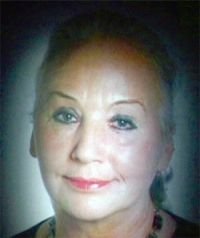
DOCUMENT SECOND: "UNRELIABLE, BECAUSE ALL WITNESSES ARE ONE NATIONALITY ..."
Vasily Mechislavovich Chernik pleased us with a text that was not composed by him. The text contains a long-standing blatant lie of the "deniers" of a reliably established fact: the girl, executed by the Nazis on October 26, 1941, is Masha Bruskina, a graduate of school No. 28 in the city of Minsk.
To an unbiased reader, the Minsk refutation, at first glance, may seem convincing. Chernik outlined four competing versions: the executed was named 1) Tamara Gorobets, 2) Masha Bruskina, 3) a certain nameless Anna, 4) Sasha Linevich. The deputy minister assures that it is impossible to stop completely at any version (although the deputy minister prefers the third and fourth versions, put forward "to the peak", when the fact that it was Bruskin in the pictures of the execution was already reliably established). After reading the text a second time, it is easy to notice that only about the authors of the version of "Masha" the author of the text narrates in a hostile and aggressive manner. Here's a phrase: "... unexpectedly quickly came to an unambiguous conclusion." Wouldn't Mr. Deputy Minister have bothered to explain what “unexpectedly fast” means in a journalistic search? Two years of relentless search - is it fast or slow? It is clear that an indefinite "quick" for a refutation is only a means to refute, and nothing more. Then the deputy minister will once again repeat this murderous "argument": "materials hastily collected by journalists." Even the fact that the Minsk dwellers Freidin and Muscovites Arkadyev and Dikhtyar, who had been looking for the truth for a long time in parallel, who were not familiar with each other, came to the same conclusion, looks like an ominous enemy conspiracy according to the crooked logic of the ill-wisher.
The rationale behind the above is simple. Mr. Chernik in his answer is silent that, starting from the late Stalin era, Soviet Union became a country with an unprecedented scale of state anti-Semitism. The peak was in 1948-1953, but even in the post-Stalinist "vegetarian" times, state anti-Semitism did not go anywhere. Soviet Belarus (unlike, say, Azerbaijan) became one of the republics where anti-Semitism was constant (with rare exceptions) and very consistent. The Holocaust was hushed up, the word "Jews" was removed from the monuments to its victims, the inscriptions in the Hebrew language were erased. A leading employee of the Minsk Institute of Philosophy, Vladimir Begun, to the applause of the authorities and the public, invented vile tales about the worldwide Jewish-Masonic conspiracy, the name of the genius artist of Belarus Marc Chagall in the local press was always either accompanied by derogatory and ominous epithets, or was completely hushed up. Against this background, the state "operation" to discredit the name of the Belarusian Jewish heroine Bruskina in 1968-1987. for all the extravagance, it was a commonplace phenomenon.
Valuable irrefutable information obtained by first-class journalists and including 18 recorded testimonies of people who knew Masha well during her lifetime and who identified her in photographs taken by one of the Lithuanian executioners, was declared unreliable by the authorities of Soviet Belarus. Why? In the archives to which Chernik refers and which were well known to the Ambassador of Belarus in Israel and former head The KGB of the republic, to the now deceased G.M. Lavitsky, it is formulated as follows: unreliable, since all the witnesses are of the same nationality. The witnesses are Masha's relatives (among them - her own father) and classmates (the school where Masha studied was Jewish). "Competent" organizations were given the task of refuting.
To begin with, I advise readers to read the text of a small documentary story by Lev Arkadiev and Ada Dikhtyar "Unknown". It can be found on the Internet at: http://mb.s5x.org/homoliber.org/ru/kg/kg010002.html. I am citing excerpts from it by edition: the almanac "Year after Year". (Moscow, 1985, p. 265-307).
Let us now return to the arguments with which Chernik "refutes" the facts presented by the journalists. Their facts, de "are based on secondary testimonies of people who had nothing to do with the activities of the underground." Sorry, Mr. Chernik, and the people who "identified" Aleksandra Linevich, did they have any remote relation to the Minsk underground? However, you do not call their testimonies "secondary". Why? Because in this case it is clear to you: the person in the photograph is best recognized by his relatives.
The deputy minister's next argument is that the evidence in favor of Masha does not deserve attention because they allegedly identified her "only 20 years after the pictures of the execution became widely known." Again, Vasily Mechislavovich, then you report without any refutation or irony that fellow villagers unanimously identified Sasha Linevich in the "unknown" in the 80s ", that is, 40 years later after the photographs" received fame. " On what basis do you make such a separation of witnesses? Is it not nationally?
But in essence, everyone understands: the wide popularity of the images of the execution does not at all mean 100% coverage of all possible participants and witnesses with the necessary information; Belated evidence of executions can only be considered false if there are other, serious reasons.
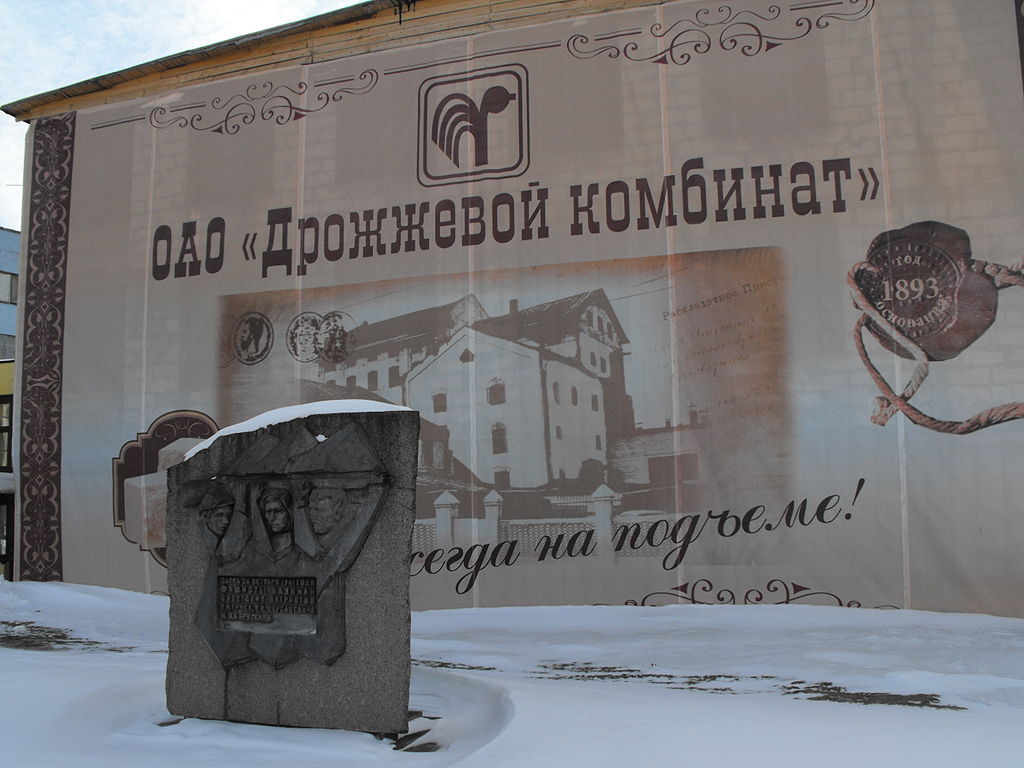 Minsk, Oktyabrskaya street. A memorial sign at the entrance of the Minsk Yeast Factory at the site of Nazi executions of K.I. Trus, V.I.Shcherbatsevich and M.B. Bruskina on October 26, 1941. Photo: Wikipedia / Avner
Minsk, Oktyabrskaya street. A memorial sign at the entrance of the Minsk Yeast Factory at the site of Nazi executions of K.I. Trus, V.I.Shcherbatsevich and M.B. Bruskina on October 26, 1941. Photo: Wikipedia / Avner More "denials": no evidence of Bruskina's underground activities was found in the archives; none of the wounded in the hospital and prisoners named Masha Bruskina. These facts, even if they are true (and this is not entirely true, see below), do not refute anything. Masha was not a leader, her activities were limited to a narrow circle; underground, the real name is carefully hidden. If any of the underground workers knew the name of Bruskina, he had no more chances to survive than Masha. The leader of her group, Kirill Ivanovich Trus, who was hanged next to her, knew the name. Trus's wife Alexandra Vladimirovna told Arkadyev and Dikhtyar that Kirill called the girl from the photo Maria. Then they had the following dialogue: "Are you confusing, maybe Anya?" “The husband called her Mary,” the woman repeated without a shadow of a doubt (p. 272). Surely she told about the name of Unknown and "competent comrades", but they did not include it in the archive (or, rather, "turned it off").
And, finally, the most lethal "denial": "According to the testimony of one of the former prisoners of the prison, who was in the same cell with an unknown person, as well as the warden of the prison, the girl who called herself Anna was 22-24 years old, had the specialty of a nurse and work experience in This profession and, importantly, she did not know Minsk at all, for she was a native of the central regions of Russia ... The fact that she was not yesterday's schoolgirl (and Masha Bruskina graduated from high school in June 1941) is clearly visible in all available photographs of the execution. "
Let's not ask now why the testimony of the odious prison warden is recognized by Chernik to establish the identity of the heroine depicted in the photographs as paramount, and the testimony of 18 classmates and relatives of Bruskina, who knew perfectly the slightest line on her face, is "secondary." The answer is clear to us (and to him). I proceed from the assumption that Stefanida Ermolaevna Kaminskaya, Masha's cellmate (I know the name from the investigation of Arkadiev and Dikhtyar, pp. 268-271) and that warden gave correct testimony to the "competent" who presented the heroine. So, firstly, in the Gestapo prison after interrogations, "aging" by 5-7 years is no problem (I am sure that I, and Chernik, having got there, God forbid, would have looked much older), but secondly, the underground worker in the dungeon does not name his real name and adheres to the "legend" exactly. And in the photographs of the execution - let no one lie! - the age of the executed is not unambiguously determined (I suggest typing "Masha Bruskina. Photos" into Google and seeing all nine pictures for yourself).
So, all the "denials" of the fact that the executed girl is Masha, the denials invented in pursuance of the order of the authorities of Soviet Belarus, the price is less than a penny. Mister Chernik, unwillingly, clearly showed how a custom lie was fabricated by the Belarusian KGB officers and, if one may say so, by historians. Here they have in their archives the testimony of Alexandra Vladimirovna Coward: the girl's name was Maria - and the testimony of Stephanida Ermolaevna Kaminskaya: the girl's name was Anna. Testimony Coward - from "will", testimony of Kaminskaya - from the dungeon. "Historians" write with an impudent face: there is evidence that the girl's name was Anna. And that's all. "Denied".
I can admit (although this is unlikely) that before the articles of Freidin, Dikhtyar and Arkadiev appeared in print, the "competent comrades" had no information that Alexandra Vladimirovna remembered the real personal name of Unknown. So after all, according to Chernik, they carried out two repeated "investigations" after these publications! If they managed to get evidence that AB did not say anything like that, and the journalists came up with her words, what a high the "competent" would raise! The three investigators would sit in the camps. Nothing like this. On the blue eye of the pseudo-historians and, at their suggestion, the Deputy Minister of Culture of the already independent Belarus, they simply continue to pretend that the corresponding testimony of Kirill Ivanovich's wife is not and was not in sight. I wouldn't be surprised if the archives were cleaned up.
I will not dwell on how the false version about Aleksandra Linevich as a member of the underground in Trus's group was fabricated by the "great scientist", candidate of historical sciences Domorad, whom Chernik aspiratedly mentions. On this occasion, my friend Mikhail Nordshtein conducted a journalistic investigation, and, I hope, he will tell the readers about it in a suitable case.
I can only add that the vile lie "Masha is not Masha" invented in Soviet Belarus, after an impeccable investigation by three journalists, cannot find any the slightest support in the world historical science... The only platform on which anti-Semitic falsifiers from Minsk can sometimes find sympathy is in the circles of some Russian historians-anti-Semites. Therefore, Mr. Chernik, already twice in different places of his official paper, proudly names with all the bibliographic bells and whistles a joint work of Russian and Belarusian scientists, where the achievements of "historians" -Domoradovites are reproduced. God is their judge.
In conclusion. I do not have all the necessary information, but, in my impression, the current Minister of Culture of Belarus does not sign the letters prepared by the Institute of History on the topic "Masha is not Masha", entrusting this very dirty work to his deputies. He knows well: Masha Bruskina's feat will last forever. And all over the world, in books about Masha and in numerous articles, they will always tell, among other things, how in Belarus, for whose freedom she gave her life, they tried and are trying to slander or silence her feat. And the names of the forgers will be named. Among them today are not only Konstantin Ilyich Domorad, but also - congratulations! - Vasily Mechislavovich Chernik.
P.S. Anyone who takes seriously the phony evidence of Chernik and his comrades will absolutely not be able to understand why the name of Maria Bruskina was carved at the place of execution of three heroes of the underground. Did the Zionist saboteurs do it, or what? Why did President Lukashenko, speaking at a rally in Yama on October 20, 2008, mention exactly the "feat of the 17-year-old Komsomol member, a prisoner of the ghetto Masha Bruskina"? And what is the result? Why does the president of Belarus know about Masha's feat, while Chernik, with all the scholarly brethren, believes that there was no trace of her feat?
I cannot but express my deep regret in connection with the fact that the President of Belarus and his entourage are instructing the heirs of the liars to answer questions on a sensitive topic, who falsified the "investigation" about Bruskina for the sake of the authorities. Henceforth, these questions will have to be addressed to the Israeli Foreign Ministry, to the ambassadors of the countries of Europe and America in Belarus. After all, Masha Bruskina, who died in the fight against the Nazis, is not only a Belarusian heroine.
"Jewish tuning fork" (monthly supplement to the newspaper "News of the week")
And where are you hanging around? And why should I go crazy for you? Do I have enough of my own troubles? .. Tell me, where have you been and why it took so long?
All this Grishina's mother said both angrily and joyfully at the same time, because her "tramp" still stands on the threshold of the hut, alive and well.
What will you answer to your mother?
I was in the forest. With Mitka.
And why he was in the forest, Grisha will not say. If Yaremchenko had allowed it, then it would have been another matter. And then he warned: "Look, lads, where were you, why were you - no one." So the mother shouldn't be told either. The mother will whisper to the grandmother, and the grandmother, you look more, will start to tell Petka. True, Petka is still a child, but still there is no need to chat.
Mother said as she cut:
More you from my house not a foot! ..
Grisha just smiled: “Oh, mom! Here comes a messenger from the forest, will give me a combat mission - and you will have nowhere to go, you will find the hidden boots. You will also be proud: not someone was entrusted with this task, but your son - Grisha ... "
But I still had to spend two days in the hut. And on the third day, Grisha was lucky: he found his old shoes. And when his mother was away somewhere, he moved to Mitka. He sat on a small stool and wiped real live ammunition with short and blunt lead noses. Mitka, of course, covered the cartridges with a rag when his friend creaked the doors, but Grisha's eyes were sharp-sighted, he noticed a copper shine.
Where are you? - Grisha raised a rag.
Where? - Mitka grinned. - Found. - A little later, mysteriously: - From parabellum.
So much for you! .. - And podkovyrnul: - My mother does not hide boots.
And what is this parabe ...
Well, revolver, big, heavy. Sashka has this, didn't I see that fascist with a bandaged hand? And Mykolay shot at ours from parabellum ... We should find it somewhere!
Why do you need that parabe ... well, a German revolver?
What do you mean why? Yaremchenko would have been handed over. For the partisans.
Grisha is a little offended - he was sitting without boots and reading a book about herbs, while Mitka at that time was collecting cartridges for parabe ... well, he was collecting a revolver, - said:
What - let's go?
Am I really? Let's go to!..
When they had already left the village, Grisha suddenly stopped and looked around in fright at Taranivka.
Mom doesn't know where I went.
Oh you, mama's son! Mom doesn't know, ”Mitka mimicked. - Come back, I'll go myself. And what is good, and I will fall on the nuts.
Mitka was obviously making fun of his friend. Grisha pushed him in the back, and they moved on.
Here is a forest clearing, dotted with all sorts of rusty pieces of iron. And there are a lot of cartridges here. It looks like a bloody battle was going on ...
Mitka and Grisha quickly filled their deep pockets with cool cartridges. In the depths of the forest, they stumbled upon a former ammunition depot. And then there was a profit - a drum from a revolver.
The sun was already setting when the boys slowly climbed out of the forest with protruding pockets. There was a clink of cartridges. But the friends were disappointed - they were not lucky enough to find a rifle, a pistol, or a grenade. The only find worthwhile is a revolver drum.
Mitka, can we sit down? - Grisha turned to his friend.
Come on, - agreed Mitka.
We sat down under a tall, branchy oak tree. Dead leaves rustled softly, branches creaked in the damp autumn wind. And in that rustling, in that creak, another sound suddenly intertwined. Mitka was the first to hear him, He raised his head and was alert. Grisha also listened.
High in the pale blue sky, an airplane floated solemnly. But now he seemed to stumble, dived sharply down. In the setting sun, the five-pointed stars on the wings flashed brightly, red as an asterisk given by the lieutenant.
Grisha, ours! - Mitka even took his breath away. - Exactly, ours!
Ours, - Grisha confirmed in amazement.
Look, look what he's doing!
The plane was behaving strangely indeed. He leveled off, made a circle over the village, and suddenly small white specks flew out of it, like white doves. The plane poured them and poured, until, roaring engines over the boys, it disappeared behind the distant forests.
Proclamations! Mitka guessed, and his face cleared up. - We have proclamations! That's great! ..
You say that - proclamations. Flyers! - corrected Grisha.
Let there be leaflets, - Mitka readily agreed.
The boys rushed to search. Yes, where is there! Not a single leaflet was visible on the ground. And then the snowflakes began to fall. The sky, trees, road turned white.
The boys shook up the bushes, swayed flexible birches, overturned the fluffy deciduous bed. All in vain. Tired, saddened, they stood under the viburnum, Mitka tore off a red bunch, gave it to a friend.
He reached for the other himself. And there, clinging to a branch, a white piece of paper fluttered in the wind.
Grisha, there is! ..
An ordinary piece of paper ... No, not an ordinary piece of paper! After all, this leaf was sent from the free land, from there, where there are no nibbles and laitukhs, there are no swastikas on bandages and banners, where one cannot hear: “Uterus, egg, cock. Bang Bang! b
Grisha glared at the white piece of paper. How well it is written in it! .. And everything, everything about their enslaved land, about the Ukrainian land, the land-suffering, blazing in fire. As if the one who wrote was in their
Taranivka, I saw how the Nazis knocked down the monument, how the kulaks and horse thieves were appointed as elders, how they robbed the people, they took away not only the "hammers and eggs", but they also seized the rams - activists, Komsomol members ...
Well, what are you moving your lips? - Mitka jumps up. - Read aloud!
Grisha looks around. But who can be in a forest glade in the evening, and even in such a turbulent time?
Read, Grisha, read! What do they write there?
“Son, brother, my dear comrade! Do not regret anything to win! People's avenger, battle-hardened, glory to you! "
The boys looked at each other. It is clear - glory to such as Mikhail Shvydak, as a gray-haired commander, as Anton Stepanovich, as Krutko. They are already battle-hardened indeed. Echelons are derailed, German commandant's offices are smashed. Although Krutko is a braggart, he still spoke the truth about the echelons and commandant's offices. And they have a direct connection with the mainland: recently a radio operator went down by parachute with a walkie-talkie. Maybe it shouldn't be cool to say this to the boys ... A radio operator on a parachute ... That's great! It would be interesting to see how she went down into the forest, how she transmitted the report from the forest, maybe even to Moscow itself! .. That's great!
Grisha carefully folded the leaflet, hid it in the sewn-in pocket-secret, where the Red Army star was lying.
We ran to Olga Vasilievna!
Olyn's mother met them on the threshold. She looked at the boys with unseeing, inflamed eyes. And barely stood on her feet. If I hadn't held on to the door frame, I would have fallen.
What do you kids want? - whispered some dry lips.
We are to Olga Vasilievna ...
There is no Oli ... Lead, damned ...
Who?! - the boys cried out at once.
The woman glanced at the boys with a heavy sad look: don't you know who now leads people, who administers the punishment?
The boys are silent: they do not know what to say to a woman, what to advise. And that tears broke.
The deserter Mykolay and the thief Kirill Lantukh brought those scoundrels. They took her away ... They led her barefoot as she stood ... - Olya's mother leaned her face against the door and burst into tears. - Oh my God, what will happen to my blood now? ..
Don't cry, aunt, - said Grisha. - Hold and release.
He said and did not believe his words himself.
Don't cry, ”Mitka repeated.
The woman, sobbing, fell silent, but when the boys left the gate, she sobbed again.
Let's go to Sashka, - groping the protruding pockets, Grisha said gloomily.
He is not at home ... For three days already.
Then - to the teacher! ..
* * *
Ekaterina Pavlovna sat by the window and looked at light snowflakes circling in a slow dance. Suddenly I heard a hum, familiar and alarming. Airplane? They were afraid of planes in Taranivka. Wasn't there such a thing - a plane with black crosses was flying, but how it would crash from a machine gun through the village, just like that, because there was nothing to do? Or drop an incendiary bomb on a thatched roof for fun. And the roof is the roof, the straw will burst into flames, and there is no hut built by the grandfather-great-grandfather.
The rumble is getting closer and closer, the plane in the window appeared and seemed to wave its wings. What is he? Or maybe? .. Maybe it's ours, maybe, what signals does it transmit to its own? .. Maybe it's her son Igor flies by, greets his mother? we are in vests. There will be more tomorrow! Do not give up!
Ekaterina Pavlovna thought about her family's fighters: her sons-falcons and her husband. “Where are you now, Peter? Where are you, my children? On what fronts do you fight the enemy? What kind of torment do you endure? Maybe in the cold and hunger, or maybe you die in captivity? "
From the window you can see the school, empty and cold. Stands like an orphan, lonely, wretched. Even in the spring, life around her was buzzing and boiling, ringing children's laughter was heard, discussions and arguments flared up in her classes. Everything was normal, filled with everyday worries and joys, worries and favorite work. It seemed that it would be so until gray hair. But no - another life has come ... Yes, in fact, what kind of life is it?
Here, in Taranivka, Ekaterina Pavlovna was born, she returned here as a teacher, here she spent her youth. For many years she taught children in this wooden and cozy school. In her native Taranivka, she first met a foreign young teacher, Pyotr Sidorovich. He came to them from somewhere from the Tauride steppes. Then they played a noisy wedding, at which half the village was walking.
They lived well with Pyotr Sidorovich, served as an example to all teachers, lived gloriously. What can I say! They raised their sons, they were both sent to Leningrad as geologists ... And before the war, the youngest, Igor, became a pilot. Voluntarily. I wrote to my parents: I went to a military school, because it smelled of gunpowder in Europe, I went because it is a great honor to be the commander of the Red Army ... What good songs they sang about the pilots:
A friend flies to a distant land,
Native winds fly after him:
Favorite city melts in a blue haze
A familiar home, a green garden and a gentle look.
People knew that the world was anxious, people felt that the war could not be avoided. But when will it start - in ten, fifteen years? Therefore, we lived in anxiety, but no one thought that the words would suddenly sound like an alarm bell like this:
"Attention attention! All radio stations of the Soviet Union speak! "
And a year before this alarming broadcast, a summons came to the teacher's family from the military registration and enlistment office. She was not very worried. So it happened before - they summoned Pyotr Sidorovich, a political worker, for military retraining. Pyotr Sidorovich came back, always thinner, tanned, smelling of the smoke of fires, but strong, rejuvenated.
This time, the husband sat for a long time at the table, his chin resting on his hand. He did not touch the borscht.
Something early this year called ...
Probably, it should be so, - tried to calm her husband Ekaterina Pavlovna. She went up to him, ruffled her graying forelock.
On another occasion, I would have answered my wife jokingly:
I'm going to retrain as a lieutenant, and I'll be back, look, as a captain. I'll be back to the captain.
But now something was not joking. Silently he stroked the thin shoulders of his wife, spoke, drawing out words, as if weighed them or sowed them on invisible sieves and sieves:
It's true. It wouldn’t be necessary, they would have let me finish the school year ... They know - the teacher ... And so, you see, they really need your Peter.
Because my Peter is smart. And the mind is always needed.
And when he threw his backpack over his shoulders, he hugged her, looked into her eyes:
In which case I will send a certificate.
What are you saying? What is the case? What is the certificate?
Of course, monetary. That's what they say in the army.
You say that ...
It is alarming now in the world, Katya ... There is a war in Europe ...
The war ... That is why Peter was sad, that is why he did not touch the dinner. He knew more than her then. Maybe he didn't know, but he felt it in his heart. This happens.
As he left, we never saw each other. I only lived on his letters. Cheerful, witty, they invigorated. And both sons wrote often, delighted the lonely mother. At first, Peter hinted - I'll see you soon, then the hints disappeared, there were fewer laughs in those letters. Once he even wrote: "Get used to it without us, men, in the house, because anything can happen."
And when the war began, I received two letters from Pyotr Sidorovich. And a few more letters from my sons - both were at the front. And then no news from all three ...
She lived in a hut alone. Still waiting for good news, listening to every rustle outside the window. They say that those who are very much waiting will wait. And she waited.
One late evening Ekaterina Pavlovna heard a soft knock, rushed to the window, and it was crying in the autumn weather, you will not understand who is behind him. I ran out into the hallway.
Maybe there was silence behind the doors for a second, but it seemed to her - eternity. Then he heard:
Is that you, Katya?
Peter? My God!
The bolt thundered, Ekaterina Pavlovna fell to her husband:
My dear ... Peter ?!
I, Katya, my beloved! I AM! Invite to the hut! Why are you ...
The doors creaked familiarly, as always, they creaked, Ekaterina Pavlovna rummaged around the front of the stove, looking for a lighter that Grisha had brought the other day. Found a boy in the forest, made of a cartridge.
No need for light, - asked Peter. - You're alone?
He carefully opened the doors and let the stranger into the hut.
Do not be alarmed, this is my friend. - He was silent. - Here we are, Ashot, and at home. And since we are really at home, this is what you, Katya, give us something hot ... We don't remember when we ate hot ...
Ekaterina Pavlovna rushed to the stove, took out the pots and cast iron to the touch. A delicious smell of borscht floated through the hut.
Borscht, half a kingdom for a bowl of borscht! - Pyotr Sidorovich joked sadly.
His companion laughed dully and hoarsely.
While the hostess was busy with the bowls, Pyotr Sidorovich managed to undress.
No, Katerina! We will not sit down at the table in such stinking rags. Give us some clean linen!
Good…
The lid of the chest creaked, and the guests breathed in home, so dear and beloved - fresh linen, rolled with a roll. Those who came with pleasure changed their clothes.
Now give us, Katya, outerwear. Me and Ashot.
In the semi-darkness we tried it on, got into trousers and jackets.
Now you and I, Ashot, are just villagers. I am a Poleschuk, and you will pass for a gypsy.
Ashot laughed softly. Pyotr Sidorovich could not resist:
No, you can't, damn it! Cover the windows, Katya, and light up! Let me at least look at you! - He paused, then uttered the words that he could but speak now: - Maybe the last time?
And she replied:
Why do you torment my heart, Peter? And so not the heart, but a continuous wound ... But have you heard anything about the sons?
Before the entourage, they corresponded. I put the letters on the front of the stove over there. Read it. And now Ashot and I are wandering through the forests and swamps - what news is there ... We barely made it to our home. And many of the encircled people did not make it.
What a terrible word - surrounded. Where did it come from? I have never heard of it.
The war gave birth, Katya ... A lot of things the war has done. It will give birth to words, and kill their creators.
You, as always, philosophize.
Life is the wisest philosopher, Katya.
The hostess quickly hung up the windows, lit the kaganets. She looked at her Peter and gasped - until then he had become unlike himself. He let go of his beard ... Only eyes, eagle eyes, she would have recognized among a thousand eyes.
Pyotr Sidorovich went to the ash tree, hugged:
You are my gray dove ...
Ekaterina Pavlovna ran her hand over his temples:
And you turned white ...
Powdered us, Katya, powdered!
His gaze slid over his comrade, and Pyotr Sidorovich threw up his hands:
So much for you. I have not even introduced you ... This is my friend Ashot. Dearer than brother. Ashot Ter-Akopov.
Small, dark-haired, hunchbacked Ashot bowed to the hostess, and this bow seemed to her both funny and touching.
This is my Katya. Ever since retraining, Ashot has been telling me about his Silva, and I about my Katya. It seems that if I met Silva on the street, I would recognize it among a million Armenian women. And he probably would have recognized you too. Really, Ashot?
The comrade nodded his head: of course, he would recognize your Katya.
Peter paused, looking at the small figure of his comrade.
We make our way from Orzhitsa itself ... Ashot is also a teacher and commissar. To the table, Ashot! For two months now I promise to treat him to yours, Katya, borscht.
The hostess stood at the table and invited me to eat, although they were already tucking in both cheeks.
Uh, Ashot, for the sake of such borscht it was worth sleeping in the hay, gnawing raw beets ... Tell me?
Ashot nodded his head - I agree, they say, I agree, but do not tear me away from an important matter ...
Ekaterina Pavlovna sadly listened to that, as it seemed to her, undeserved praise - what kind of borscht, lean, yesterday's. It was from hunger that he seemed tasty to Peter. Or he wants to make something pleasant for his Katya, who once knew how to cook borscht. Indeed, you can't drag by the ears, it happened, from such a borscht.
Peter liked to wash his hands after work, put on a white embroidered shirt, sit down at the table and ask:
And what has our mother cooked and baked here? And the smells, and the aromas? No, we guys have never eaten this!
The hostess, bustling around the bowls-plates, even bloomed from such attention.
Ugh! - the owner took a deep breath after dinner. - Today we lads ate like hammerheads.
"We" in the sense of "I" ... What kind of hammermen are children? And they ate hard not because they were hungry. The father was laughing. And they wanted to please my mother. Because there was a cult of the mother in the house. Mother is the most beautiful, mother is the most intelligent, mother always does the right thing, mother's word is law.
All this is so close and distant already, shrouded not so much for years as separated hard time who came to our land.
Ekaterina Pavlovna stood near the table, her arms folded across her chest, watched as Pyotr Sidorovich and Ashot zealously scooped up yesterday's borscht with spoons. There was a smile in the corners of her lips, as if the worries had already subsided, and the grief did not roam the smoky military roads. As if Peter would get up from the table now, smoke a cigarette, hug her slender shoulders and say:
Now, old lady, bye-bye ...
Indeed, having had supper, Pyotr Sidorovich got up, walked around the hut, glancing around at it, as if looking for changes in it. But he didn’t say “bye-bye,” but asked his wife, not yet believing that happiness would smile at him and Ashot:
Do you have some kind of terry?
Why then. There is. Still yours. I am now.
The men lit a cigarette, inhaled with the old Kremenchug, incredibly fragrant for them makhorka.
Eh, I should sleep for five hundred minutes! - Pyotr Sidorovich twisted his hands so that they crunched at the joints.
Who does not give you, - the hostess rushed to the bed. - I'll go to bed now.
Pyotr Sidorovich became stern.
Where did you go ...
Didn't you go home?
Silently shook his head.
No, not home, Katya.
Ekaterina Pavlovna turned pale at once. Still, because with her mind she was able to comprehend: Peter is a commissar, he [cannot stand aside when the battle is bloody and cruel. But with my heart ... How is it - I came, ate borscht - and be healthy, black-browed ...
She wanted to ask: "Where are you going, Peter, in the dead of night?" But she didn't ask. After all, people like Peter choose the time so that neither the alien enemy, nor their own enemy would see his traces.
Pyotr Sidorovich unexpectedly asked:
Where is Yaremchenko? In the army? Evacuation?
Neither there nor there. Before last days was at home, and then disappeared.
Do you know where?
Rumor has it that they saw him in the forest.
Oh, this is already good! Maybe we can find him, Ashot? Our forests are famous. From here Nikolay Shchors started his campaign. I don’t think it’s empty right now. In other forests we met separate groups partisan. But Ashot and I decided so: see Katya, and then fight. Before complete victory! And after the victory, we all go to Yerevan, to Lake Sevan, to Silva Ter-Akopova. Is that what we planned, Ashot?
She listened to Peter's mock-funny conversation, and she was embarrassed in front of Commissioner Ashot for those involuntarily escaping words: "Didn't you go home?" How could she think that about Peter?
Meanwhile, bearded Peter affectionately, as always happened, put his warm arms around her shoulders.
What are you thinking, Katya?
Oh nothing. Everything will be fine, Peter. I believe.
That's fine. You will believe - there will be order. The main thing in life is Eerit, Katya. Ashot and I walked many kilometers across our land and saw everything: both those who believe and those who do not believe ... We met and saw our enemies ... our enemies. How scary it is - "your enemies" ...
And in Taranivka there are such.
Unfortunately, there are eyes everywhere ... Well, Katya, forgive me. It's time for Ashot and me!
Peter and Ashot left into the darkness of the night. And again it became creepy in the hut. And there was such an impression as if Peter did not come with that beautiful hunch-nosed Ashot, as if she had dreamed everything. But the letters from her sons, brought by Peter, brought her back to reality - there was Peter, over there, at the table, with Ashot they ate borscht, smoked makhorka.
Often Ekaterina Pavlovna would sit by the window and remember, remember, remember ...
On those eerily white days, when the blizzards were buzzing outside the window, and even more at nights, she recalled her life. School for working youth. Teacher courses in Priluki. Then the first steps of the teacher, the arrival of the steppe dweller Peter in the village, a wedding, children, cloudless happiness with Peter, seeing off his sons, separation from her husband. She lived by meetings and wires.
And now Peter has already given her several meetings. And although the meetings were only at night and disturbed the soul (“What if someone tracks down?”), She lived by them. Peter, you see, then he will bring a Soviet newspaper, then just good news, as he says, with Big land... Once with Mikhail Shvydak I came, the second - with Anton Stepanovich. Peter spoke - they have already contacted the mainland by radio, they will fight their way with Ashot through the front line. In the meantime, "we pinch the Germans." Rumors about this are in the villages. The Nazis are furious after such pinches ... Yesterday, people said, a large ammunition depot was blown up by partisans in Yablonivka.
Ekaterina Pavlovna even shuddered when she heard the cry of an owl. She was never superstitious, but in recent times, if a dog howls or a cattle howls at night, goosebumps will run through the body. And now this co-za ... And yesterday she flew in, and the day before yesterday ... Ekaterina Pavlovna came out, chased her away, but the owl came back again, screaming from a pine tree near the fence.
Someone rustled in the entryway. Frightened and joyful, she rushed to the door, although she knew that during the day Peter could not come.
May I, Ekaterina Pavlovna? - she heard boyish voices.
Is that you, Shchors people? Sit down, tell me how you are there ... fighting?
Instead of answering, the boys sniffed and pulled up their trousers. And in his pockets it zinked pitifully.
What have you got there?
Look, otherwise someone who is unkind will notice ...
So much for yes. Do not come across to the eyes of the duro-lights with these things. - Eyes pointed to their protruding pockets. - Well, tell me why you came? I know you don't come around idle. Is that so or not?
And again zen-zen.
Grisha deftly took a leaflet out of a secret pocket, straightened it, and handed it to Ekaterina Pavlovna.
Where are you?
They found it in the forest ... They threw it off the plane ...
Ekaterina Pavlovna quickly put on her glasses and, restraining her excitement, scanned the leaflet with her eyes. She looked anxiously at the windows.
Did you show it to anyone?
N-no ... They wanted to be a pioneer leader, but the Germans arrested her.
Olya ?! - Ekaterina Pavlovna was horrified.
Yeah. Barefoot they led ... Through the snow.
For several long minutes Ekaterina Pavlovna looked out the window, behind which large snowflakes were falling on the cold ground, then she again brought the leaflet found by the boys to her eyes. And she began to read - quietly at first, and then louder - that Ukraine is on fire, suffering and exhausted, but unsubdued, not brought to its knees by the enemy ...
Grisha listens, and those words seem alive to him. Like people, like birds ... He listens and looks at the high gates covered with snow. Suddenly the gates flew open, and Grisha, turning pale, whispered loudly:
Ekaterina Pavlovna, look! ..
Ekaterina Pavlovna cried out dully: surrounded by the Nazis, Pyotr Sidorovich entered the courtyard with an uncertain gait.
As soon as she had time to hide the leaflet in her bosom, the Nazis banged their rifle butts on the hay doors. Then Mykolay with a bandaged head grew up on the threshold.
Come out! Admire your bandit!
This was spoken by her former student, whom she taught to love good and hate evil, whom she taught to respect elders.
How dare you…
Well, be silent! Your reign is over! Come out! Well, who is it told?
As if Ekaterina Pavlovna went out into the courtyard not with her own feet and almost fell, meeting some alien and at the same time dear, pleading look of Peter. He leaned against the gate, unable to keep his feet.
Do you recognize? - one of the Nazis, probably the eldest, nodded at Pyotr Sidorovich. He held a cigarette in his teeth and a huge parabellum in his hands. He threw it up, caught it in the air - was amused. The overcoat on the Nazi is not like everyone else's, not green, but black. And on the sleeve is a human skull.
“The SS man,” Ekaterina Pavlovna even went cold, “now that's it. Peter cannot escape from such clutches ... "
She leaned forward - she wanted to step towards her Peter, but a hoarse voice stopped her:
This is the first time I see this woman.
For a moment it stood petrified. Why did Peter say this? Or maybe it should be so? .. What should she do? .. What? ..
The truth was told by this ... tshilovek? the one in a black overcoat with a skull on his sleeve looked at the teacher.
Once again I met the eyes of Peter, in which I read the order not to recognize him. And she answered in a low voice, which she herself barely heard:
Truth…
The hefty Mykolay shrugged his broad shoulders, as if a rifle belt pressed his shoulder.
The old hag breasts, - and spat. - I know them as flaky. They campaigned on the collective farm, sat in the people's court. My brother - to prison ...
A Nazi with a skull on his sleeve nodded to young Nalygach, who roughly pushed his former teacher to the gate. Peter stood at the gate with her hands tied back. Capless, with a bruised temple and a bruise near the left eye, with swollen lips, on which blood clotted.
Mykolay poked Pyotr Sidorovich in the side with the butt of his rifle:
Step march, righteous man!
When they drank him out of the gate, Mykolay angrily threw to Ekaterina Pavlovna:
Is this your truth now?
The teacher slowly turned around, small, pale, gray-haired, and looked at Mykolai so that he was even embarrassed.
Our truth is brighter than the sun. Throw it into the mud, stamp it with your feet, and it will still shine! Remember!
Nalygach spat again:
Well, you rassusolivaet ... Your truth went into the forest for firewood and got lost.
Nothing, the time will come, will come out of the forest ...
They do not leave the forest, we lead out of the forest. Here is your righteous man, the commissar, they seized. We'll catch them all one by one! And we will outweigh!
You can't hang everyone, Nikolai. Didn't you think that a rope is being prepared for you, too?
Young Nalygach choked with rage:
Well, stop campaigning! ..
When the teachers were taken out of the yard, Grisha and Mitka closed the doors of the hut and ran after them. Mykolay looked around and shook his fist.
Why are you running around here, you freaks? We can do without you! Well, come on!
The boys lagged behind a little, but did not turn back.
There is a swamp in the middle of Taranivka in an uneven oval. In spring and summer frogs croak in it, sharp tall sedge grows, water is always rusty, stagnant.
This is where the Nazis drove old men, frightened women with children ...
The crowd shifted from foot to foot and was silent, the neighbors were looking for neighbors to be together at such moments: they say, death is red in peace. An SS officer walked in front of the crowd with ambition. He impatiently glanced at his watch, amused himself with a cigarette, blowing smoke rings from his mouth. Apparently, for him such gatherings are common, everyday, he has held more than one and, perhaps, not in one country in Europe. He did not even look at people. As if Yeovse were not people in front of him, but cattle.
When the teachers were brought in, the officer ordered Pyotr Sidorovich to be put facing the crowd, and Ekaterina Pavlovna to be pushed to the women.
The SS man's calm was short-lived. Suddenly, as if wound by an invisible spring, he snatched out the parabellum and, roughly jabbing at Pyotr Sidorovich, addressed the crowd:
Do you recognize? .. This thug bang-bang shells ... church ... church. Yablunivka ... Understand?
A heavy silence hung over the swamp. And in this silence the officer took a silver cigarette case out of his pocket and pressed a button. The quiet click of the cigarette case sounded like a shot. A cigarette popped out of the case. The SS man took a cigarette with his lips, pressed another button, and fire splashed out. With pleasure and at the same time somehow nervously the officer puffed on the smoke.
And people were silent, holding their breath. As if there was no one in the swamp except the officer. The eyeless punk, already familiar to the rams, from the district council, who was standing aside, next to the soldiers, rolled up to the officer, muttered something in German. He nodded his head graciously.
The punk licked his lips, straightened, even got up on his toes to appear taller, and threw into the silent crowd:
Pan Herr Ober-Lieutenant said: “This partisan blew up the ammunition depot in Yablonivka in the church. Your new Pan Elder Mykola Nalygach recognized the director of the Taraniv school in the bandit. Do you know this darling? "
The people were gloomily silent. Then Mykolay Nalygach approached the crowd, looked for someone with his eyes.
Is Grandfather Toothed here?
Tutochki. Why am I shdalsha to you?
And who gave you a year of coercion, eh? Not this righteous man when he sat in the people's court? Remember the old bootleg?
Grandfather chewed his lips, coughed, then replied:
I don’t remember anything. I have not seen this person without meeting ...
A voice ran through the crowd like a light spring breeze. Look, the handsome man with the bandage of the policeman did not persuade the quiet, meek grandfather of the Toothed handsome man! In Grishin's eyes, grandfather Zubaty seemed to have grown larger, broader in the shoulders, and became more solid.
Mykolay angrily flashed his expressive eyes at his grandfather, said to the eyeless punk:
They all talk like dogs!
He translated Mykolai's words to the SS man. The officer grimaced and looked at Pyotr Sidorovich with some dull eyes:
Will you talk?
I will, - answered Pyotr Sidorovich calmly.
The crowd stirred, glancing fearfully at the teacher. Someone from the villagers took her by the arm, someone supported her from the other side.
Good people, - heard such a familiar and dear voice of the rams. Pyotr Sidorovich, like Ekaterina Pavlovna, taught their children to love the Soviet land, their land, fairy woods and blue lakes, fragrant meadows and wide fields. He was with them in days of joy and in days of sorrow. The newcomer has become dear and close to them.
And here he stands in front of them - with a lush fair-haired beard, with kind gray eyes, in which sadness for life is frozen, on the ground where his Komsomol youth passed, where his children grew up, where he learned so many human joys.
The fascist told the truth. They grabbed me when I was returning from the operation. They want you to recognize me. They want to declare your village a partisan one in order to burn down Taranivka ...
People huddle even closer to one another.
Halt! Enough! .. - the officer interrupted the teacher in a nervous guttural voice. - I'll talk!
But Pyotr Sidorovich does not seem to hear the enemy's "halt!" His voice grew stronger, sounded louder, and everyone heard not only the words addressed to them, but also the breathing of the teacher, heavy, hoarse.
Goodbye, people! .. Your sons will be back soon! .. Do not sit idly by! ..
The officer jumped up to the teacher and punched him in the face. Pyotr Sidorovich moved his broad shoulders, trying to break the rope. But a shot rang out, the second ... And the teacher fell on the frozen ground, barely covered with the first fluffy snow.
The officer turned his face twisted with anger towards the crowd:
We will do this, - he pointed to the dead, - a partisan, a communist, a Komsomol - bang-bang! Who is against the Fuhrer, Deutschen Zoldaten - bang bang!
Grisha looked impatiently at the forest with hope. Mitka gripped his friend's elbow tightly, biting his lip.
Look, Olga Vasilievna is being led ...
Two hefty, well-fed chickens were leading a pale girl, thin as a blade of grass. Olya walked in an old home dress, walked barefoot in the snow, accompanied by a black retinue. On her chest was a plaque with the inscription: "Partisan". From the crowd rushed to the German officer Olin's mother, white as snow, fell on her knees in front of him.
Pan ... have mercy! .. For Christ's sake, have mercy!
Olga stopped, straightened up.
Mama! Stand up! Who are you pleading with? I don’t want to see you on your knees before I die! .. Stand up! - ordered Olya.
The mother got up and rushed to her daughter. It seemed as if it were not for two guards leading Olya, but two hundred, and then the mother would break through to her daughter. At such moments, mothers do not think about the danger, that they can be killed, maimed, insulted ...
Panok fawned at the officer, translating Olya's words. The SS man, not hiding his anger, waved his hand and barked a terrible word, after which there is always someone in this world who does not survive:
A volley rang out. The mother fell at once, arms outstretched. And froze in the snow. Olya just swayed from the bullet that hit her. Blood ran down her neck, down her white dress. Then Olya's head sank powerlessly onto her chest, and slowly, as if reluctantly, Olya fell to the ground. Everything that happened was as in a fog, as in bad dream... And the snow kept falling and falling, sprinkling bloody footprints ...
People returned home silent, depressed.
A voice rang in my ears: now the barking, squeaky SS man, now the insinuating, with a German accent of an eyeless punk, now the rude headman Mykola. But in all these voices there was one and the same thing: "So it will be with everyone who will oppose the Wehrmacht, who will join the partisans, who will help them."
As soon as the SS man ordered the people to disperse, Taranivka burst into flames. People did not shout, only whispered doomedly:
Olga's hut was set on fire! ..
And another one is burning. Teachers ... Our teacher.
And there is the third ... Anton ...
Fourth ...
People ran to the wells, wetted the row, climbed onto their huts, covered the eaves and sat waiting - God forbid, the fire would spread. Those who already had their houses on fire ran around the fire, stretched out their hands:
Good people, save!
To those who responded to the cry and rushed to put out the fire, the Nazis pointed their carbines in the chest:
Whoever comes up - we will shoot! ..
Ekaterina Pavlovna was sitting near the burnt-out hut, black, motionless, as if lifeless. People came up, sat down next to them on a pile of rescued belongings. And Grisha and Mitka were here ... They sat in silence for a long time. And what do you say to the unfortunate Ekaterina Pavlovna? Whatever you say, it still won't help. No words can raise Pyotr Sidorovich from the ground. His song will no longer fly over meadows and groves at weddings and harvest festivals, his velvet baritone will not ring at lessons, at lectures in the club ...
Or maybe the best support is to sit next to her in silence so that she does not think that she is lonely, abandoned by everyone.
When the people were gone, Grisha asked quietly:
Ekaterina Pavlovna, where will you live?
To live ... How can you live after all this, children? - the teacher moaned.
Mitka and Grisha clung to her, trying to hold back their sobs, they were numb. But Grisha broke the silence again:
Do you know what, Ekaterina Pavlovna?
She raised her head.
What, my boy?
Come to us ...
Thank you, boy, for your kind heart ... - The teacher hugged Grisha. - Indeed, you have to live somewhere. But you also have a lot of your own ...
Mitka coughed into his fist:
Yes, you, Grisha, are not very convenient. Is not it so? The hut is tiny. And we have two rooms: one is large and the other is small. Ekaterina Pavlovna will live in a little one. Truth?
The teacher hugged Mitka too, her lips compressed in a bitter smile:
Of course, Mitya, of course.
Then we will harness the Gray ... We will instantly!
Okay, kids.
When the boys walked away from the conflagration, they looked around. In the black snow, their teacher looked like a wounded bird near a devastated nest.
In about half an hour, the boys arrived at Seyom, packed the surviving things, helped the teacher to get on the cart. They took me to Mitka. Taranivtsy went out to the gate and silently bowed to the grief-stricken teacher.
* * *
No matter what they say in the Movchanov hut, they will certainly be transferred to punishment.
Thank God, I have never seen such horror as I live. And now, consider, the German will soon let all of us into the expense, - the grandmother shakes her head sadly. - And where did these partisans go? That waste, takali with their machine guns, and now something has quieted down.
Grisha enters into the conversation because he is the owner. Mom herself said so. Therefore, it is useless for him to keep silent.
The guerrillas are doing what they need to do.
How is it - what is needed? - the mother shrugs.
And so. Yaremchenko protects the village.
I won't understand this either, - the grandmother stirred. - How does it save?
Well, don't attack the Germans.
And what kind of partisans are they then?
Well, they attack in other places, not in their own village. How Pyotr Sidorovich blew up shells ... Because if the Germans find out that the village is partisan, they will immediately burn it ... That's it. And all people will be destroyed.
They will burn them anyway, they will still be used for consumption, '' the grandmother shakes her gray head.
Mitka interrupted the conversation. Without sweeping his boots, he stood on the threshold, wiped his nose with his sleeve.
Grisha, Ekaterina Pavlovna is calling you.
If i knew…
And so with his eyes he leads around that Grisha guesses - his friend knows why Ekaterina Pavlovna is calling him. Knows!
We walked along a familiar and at the same time unfamiliar street. There used to be a hut here, bright and welcoming. And the cheerful-eyed Olya, their pioneer leader, lived in this hut. The hut knew the song to Olya, and the earth around her was a girl's hands. How many flowers were planted by those tireless hands every year! From early spring to late autumn cornflowers turned blue, poppies blushed, levkoi trembled in the wind, salvias blazed. Now, instead of a hut - a conflagration, instead of a cheerful song, a predatory wind hums in the chimney.
The same is on the estate of Anton Stepanovich. Only the chimney is sticking out. A piece of old tin sways beside her and squeaks disgustingly ...
Ekaterina Pavlovna was sitting, wrapped in a warm kerchief. Before her lay neatly cut pieces of paper from a notebook. The teacher took out the leaflet brought by the boys and put it on the table.
That's what I want to tell you guys ...
She spoke and thought, as if she was deciding whether to speak to the boys or not to speak.
I told you then at the conflagration: "Is it possible to live with a donkey of all this?" I often remembered those words. And I understood. It was not me, it was my great grief that spoke ... But you have to live. And not just live ...
Sit down, guys, sit down ... Yes, you have to live and fight, or rather, live in a struggle. Fight in the ways available to us. Anton Stepanovich fights with a machine gun in his hands, and we do it in a different way. If we think and figure it out, we can do a lot. - She was silent, - People should know the truth. How can you more people... And we will do it. Sit down and write ... dictation.
The boys sat down at the table, sculpted pens, sheets of paper. And there was a whiff of a quiet and peaceful day, as it happened before the war. And it seemed to them: there are no elders and black noses in Taranivka, and there are no war and worries on Soviet soil. Now the teacher will dictate to them with her melodious head the verses of the poet Tychina:
So let yourself, as they know,
crazy, dying, -
we create our own ...
And they will sort out where the subject is in the sentence, where the predicate, where the noun, where the verbal participle. Then the bell will ring, and they will run out into the spacious schoolyard, share the snowman, play snowballs, and some girl will definitely get snow behind the collar. And there will be so much laughter!
But the boys will not disassemble the proposal and will not have fun with snowballs. Their. the teacher tells them different words:
Write clearly so that everyone can make out ... And I will write. So ... "Son, my brother, my comrade!"
They listened to their teacher, and it seemed to them that she was addressing her own children with a message, to the falcon sons that they were fighting the enemy in the harsh sky. He addresses their comrades. To those who went in ley and who must go tomorrow ”Because now you cannot sit in the oven, when you have hands that can hold weapons, you have eyes that can see the enemy ...
- “Young warrior! You were raised and educated by the great Party. She was preparing for you a builder of a great socialist power, a participant in a wonderful era of great works.
You grew up courageous and kind from the kind, soft Ukrainian nature. You were all creative in your work, and all your land, your vast fields have already begun to sing a song to your inspiration, and your old parents rejoiced, looking at you, and rejuvenated their souls. "
Grisha stop for a moment, he wants to tell his teacher: clever man wrote this flyer. Who does not take up arms and go against the fiendish SS men or, against their werewolves, having read these words as if they were red-hot in a forge?
But he said nothing to Ekaterina Pavlovna. She, noticing that he stopped, asked:
And the boys again transferred to paper the hot words from the leaflet, which was born somewhere there, behind the distant fronts, and sank on the land of Polissya.
- "Fifteen years from now" in the prime of your years, you would have transformed your land beyond recognition. You would plant a hundred million fruit trees in Ukraine, you would transform its landscape and even the climate and live in your garden, praised by your poets, glorified by your artists ...
Young man, my friend, kind, warm-hearted and courageous, forget the kindness of the pile! "
Ekaterina Pavlovna fell silent, ran her hand over her forehead, and Grisha thought: “How can you forget your kindness? If you are kind, how can you forget about it? The good cannot be evil ... "
But again a quiet, gentle, but convincing voice sounds in the hut of the village, lost in the forest.
- “Fascist evil has fallen on us.
Ukraine is on fire! Ukraine is in the yoke!
Young man, my brother, hide your kindness!
Bitter your soul, hate the man-eating gate.
Let it choke on your hatred, let it perish from your fire!
Be bottomlessly generous in retribution for the evil done to you! .. "
How simple everything is, but you, Grisha, did not document it. That is why and to whom you have to be merciless, forget your kindness - to the hated enemy.
- “Do not forget anything, not a single tear!
Aim, sniper, falcon!
Aim, partisan! .. "
Grisha raised his head, and Ekaterina Pavlovna read in his eyes: "You see, about the partisans here ..." These words are addressed to Anton Stepanovich, addressed to Mikhail Shvydak, who, probably with his gray-haired commander, is already forming a regiment near Moscow or in the Donbass, near Leningrad or Murmansk. The front is large, stretching from the North to the Black Seas. And everywhere you need fighters, and everywhere you need courage. What a pity that Grisha and Mitka cannot be fighters yet. But Ekaterina Pavlovna says: everyone must fight in the ways available to him.
We write, children, we write ...
“Look, there’s not a man in your sight. This is a bastard who broke your life, burst into your honest land and said:
"I have come to destroy your family ..."
Yes, it's true - the enemy broke our lives and came to deprive our people. He killed Grishin's father, killed the teacher Pyotr Sidorovich, killed Olya, cheerful and kind. Probably, the person who wrote this leaflet walked through Ukraine, saw hunger and cold, saw blood, tears and death. Otherwise, he probably won't write something like that. Probably, the one who wrote, also hid his kindness, hated with all his soul the cannibal enemy.
"My Ukrainian land, what trash is creeping over you!"
Grisha even shuddered, even pulled his head into his shoulders, as if he felt this brown trash creeping over him ...
Grisha writes clearly, letter to letter, so that those who will read do not stumble, so that hot words burn the soul, reach the human heart.
"My comrades, my sons!" - hears the living voice of the murdered father.
"For our Ukrainian Soviet culture - fire!" - the voice of the shot Olya.
The mighty Pyotr Sidorovich shouts:
"Hit the fascists hard, in Zaporozhye!" ...
E-eh, Mitka, Mitka, why weren't we born ten years earlier? .. Not scribbles now would be writing, but beating fascists like Shvydak, Yaremchenko, partisans ...
Step back and write the signature below in large letters: A. Dovzhenko ... Did you write? Now let’s write to me. Like this. Take paper again ...
Ekaterina Pavlovna, who is this, A. Dovzhenko?
Alexander Dovzhenko is an artist, filmmaker and writer.
Wow! Is it possible for one person to combine so many professions in himself?
Maybe my dears. Maybe! If he has a big heart... If he really loves his native land. It was he who said the prophetic words: “A thousand, two, three thousand years will pass. With what trepidation and envy young men, men and sages will remember us, about the war and about our entire generation ... people-knights, who have suffered so much misfortune and happiness, so much sorrow and joy, so much sweat, so much struggle, and labor, and victories that would be more than enough for a dozen generations. How many books will be written about us! How many songs! How many noble heirs-young men will be transported by dreams in a time machine into our majestic epoch! In an era when it was hard, when nothing was given for nothing, when every piece of their land was paid with blood and life. "
The boys, as if spellbound, listened to the teacher, caught her words, unusual, blazing with heat, words that were alive, voluminous, that seemed to glow. These words turned the souls of the boy.
Grisha and Mitka got up from the table, somehow strange, solemn, agitated. The teacher also rose.
Thank you. If Dovzhenko finds out about your affairs, he will also say thank you. Have you seen the film "Shchors"?
Have you seen! - both were delighted. - How Shchors beat the Germans! We sang a song about him, with Olga Vasilievna ...
At the recollection of Olga Vasilyevna they fell silent, as if they were honoring the memory with a minute of silence. And not only a pioneer leader, but also Pyotr Sidorovich and Father Grishinov ...
Ekaterina Pavlovna was the first to respond.
Have you forgotten that song?
We remember! .. How many sang. In the lessons learned.
Well, “we ate we learned ... well, little by little ...
Their teacher sang almost in a whisper:
A detachment was walking along the shore,
Walked from afar.
And the boys picked up a little louder. And an exciting pre-war song poured through the hut.
Walked under the red banner
Regiment commander ...
E-eh, e-eh, regiment commander.
They did not notice how they switched from "quietly" to "loud".
The head is tied
Blood is on the sleeve.
The boys 'eyes were shining, the boys' hearts were pounding.
The bloody trail spreads
On the damp grass.
E-eh, e-eh, on the damp grass.
The teacher fell silent, and the boys fell silent too. But the song didn’t stop. It seemed to ring in each of them in their hearts.
Ekaterina Pavlovna slowly walked to the window, behind which snowflakes were falling lazily.
So, - she said, as in a lesson, when she summed up what was said, - the film "Shchors" was directed by Alexander Petrovich Dovzhenko. He is our fellow countryman, Poleschuk. From Sosnitsa. And now he addressed the Soviet soldiers and enslaved people with a warm word ... Write, children, more ...
And leaflets went on a spree on Taranivka. We got to Khoroshevo, flew to Chernobaevka.
Then the boys wrote new leaflets, the teacher wrote them herself. Sashko brought messages from the Soviet Information Bureau from the forest, and Ekaterina Pavlovna melted dry figures and facts from the Information Bureau's messages into fiery words.
The leaves from the student's notebook worried people, instilled faith in that happy day when they would be swept away from native land invaders, victory will come ...
Once his mother sent Grisha to grandfather Zubaty to ask for a loan of salt. Baba Denisikha just returned from work. She breathed grain in the barn. And now she was turning it out of the many pockets sewn to the inside of her skirt, apron and jacket.
Why are you looking at how that frightened Lantukh? - Grisha said softly. - Why are you grinning? Doesn't your mother steal from the new government?
Steals! - Grisha admitted.
If you do not steal, you will not survive. Previously, it used to be considered a sin - to steal on a collective farm. And now you can, because it's not mine, not yours, but damn. Herman will take it to his ksuaterland anyway ... Well, choose, lad, a rye cockle ... So that you never see anything except for the cockle all your life! So that you bake cakes from a cockle, and brew coffee from a cockle, and cocoa from a cockle!
Who is this, granny?
Who, if not the accursed Fuhler! Oh, so that you, mangy and smelly! ..
The grandfather waits patiently for the old woman to speak to the end, does not interrupt, only clears his throat into a fist. Unless he throws his beloved:
It, I will report to you ... that, of course ...
- "I will report to you, I will report to you," the old woman mimics the grandfather. - Been silent!
But whoever you, that ... - And to Grisha: - My woman will shave with an awl ...
The old woman liked the grandfather's words, she even smiled.
I would have seen that fuler - I would have scratched out his eyes!
Hero, - threw the old one.
I would have been silent already ... If it were not for my old years:
The old woman was silent. Then the grandfather started talking:
And you were on the rash right? .. To push such people into rashhod! Olya, I still reaped her like this, nursed her in my arms, walked as a woman on name days. Her mother, the woolly one, did not go in. As the lug of that fascist fell, you can't pick it up again. Didn't kill her. When they were buried, you will see - not a single scratch on it. From the razhrava sherdscha ... And Pyotr Shidorovich, what a man! .. Such people are rare and zealous give birth to. And that bastard Priymakov wanted me to eat the teacher! .. Not rain, cool-headed, not rain, traitor! .. - Grandfather paused, gathering his thoughts. - So, I came home and told the woman: "Our Hitler boys are bent, oh, I’ll report to you." Tell my woman: “And so that they were bent in three deaths. Maybe people like you, shaken out sacks, and bent. Oh, and you, old, moved your mind, like a dead calf with a tail ... ”It didn't go like that. But I do a closet: I was sewing, I will report to you, I was still sewing ... - the grandfather paused again. - Well, if we’re talking about it, or it’s easier to scale, we had a chat.
Oh, you see, - Baba Zubataya joined the conversation. - Po-gyr-ka-fox, - she stretched out the word through the warehouses. - You still don't know how they repent. They have been wearing bruises for a month - they are gnawing ...
The grandfather calmly waited until the old woman calmed down, and continued again:
One of these days a shoshedka is cheering me, gives me too much check. Read it, he says. I am reading. And in that too much it is written - wait, people of the sons of shvoykh, prepare vodka and zhakushka, boiled and fried, because we will return soon ...
Grisha smiled - there was no vodka and snacks, but let it be ...
So that's what I'm talking about. It turns out that our sewing, I will report to you, somewhere there is a rashtet, - the grandfather pointed with a crooked and smoky finger behind the woods, - our sewing was multiplying. Maybe it will show up very quickly. They said: ours has nothing. And there you will see the chocolates with multiple beads. So, maybe our Hitler guys won't be shoved ... Huh? It is a pity that our gadgets are now gone, otherwise I would have read it to the stupid grandfather, explained what was happening.
Grandfather turned to him for advice, spoke to him as an equal. I wish Mitya would hear this conversation! ..
Exactly, not bent! - Grisha agreed gravely. - Moscow radio broadcast how many fascist divisions have already been ground by ours ...
Grandfather raised his bushy eyebrows in disbelief. His beard stirred, the gray hair on his head tousled.
Moshkovshskoe, you say? .. And they, bastards, interpret - Moshkva seems to be already theirs, German ...
Ereshut, - he confidently argued to his grandfather.
The grandfather coughed, and coughing, he asked unexpectedly sternly:
And where do you get the idea that the gnarly radio is broadcasting?
Such a rumor has passed ...
Shlu-uh, - mimicked the boy. - A lousy war breeds a shtolok of scum! Them, those scum, now like a shobaki fleas. I don’t believe the slums. You are better than a closet to a stupid grandfather, where do you really reap what the gnarly radio is broadcasting?
I know, - Grisha again evaded the answer. He just smiled mysteriously. Like, she brought a magpie on her tail. Do not tell my grandfather about Sashka, the receiver, the teacher, the leaflets. Grandfather will tell Denisikha, and she will ring the bell all over the world.
Look you, - the grandfather turned his head. He liked that the boy didn't say too much.
But Grisha still could not resist, leaned over to his grandfather, whispered:
Let's wait, grandfather, for ours! ..
Grishina's news did not seem to please Zubaty's grandfather.
Rainy, but not lice ... That's what the zhakavyka is about. Eh, we would have waited for that enemy ... Only because she was strong and terrible, I will report to you, the enemy sewed ...
Grandfather Toothed says the truth - the enemy's strength is still strong. Strong. But the holiday will come! Can't help but come! Howling and my grandmother said that this does not happen in life, so that only grief and grief to a person, only sorrow in the soul. Either it is gloomy, it is raining, or the weather will clear up, the sun will look out and cheer up the soul, warm the heart ... Anyway, the sun will peep into our window! Will definitely drop by!
Grandfather Denis thinks so too. Such a life has come that only faith and hope glimmer in a person. If a person is deprived of them, then, consider, the person is no longer there. What kind of person is this without faith and hope?
It will be about one of the first known executions of Soviet underground workers (if not the very first). In this case, both the executed and the executioners are known. This is for yesterday's post about war criminals. It is suddenly if someone did not like their appearance. Or someone thinks that some of them were executed for nothing, for nothing. "For with what judgment you judge, you will be judged; and with what measure you measure, it will be measured to you also." It couldn't be better. All under the cut.
Lead to execution
Soviet underground workers before execution in Minsk. In the center is 16-year-old Maria Bruskina with a plywood shield on her chest and an inscription in German and Russian: "We are partisans who fired at German troops." Left - Kirill Ivanovich Coward, worker of the Minsk plant named after V.I. Myasnikova, on the right - 16-year-old Volodya Shcherbatsevich. 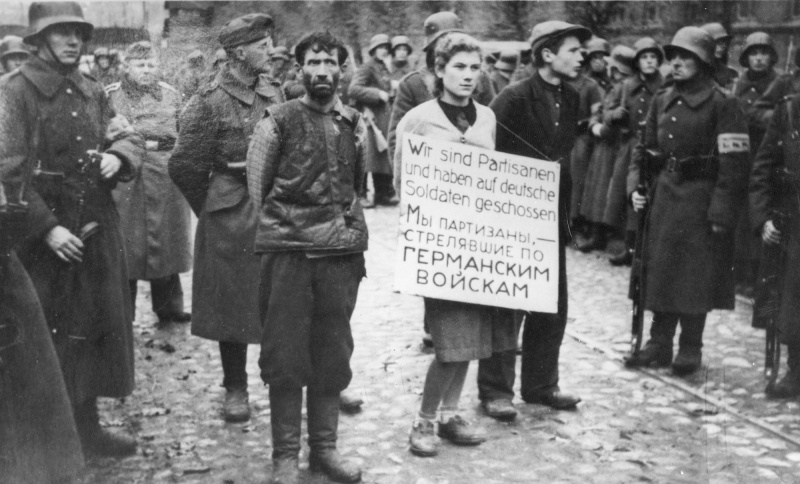
This is the first public execution in the occupied territories. On that day in Minsk, 12 Soviet underground workers were hanged on the arch of a yeast factory in Minsk, helping the wounded Red Army soldiers to escape from captivity. In the photo - the moment of preparation for hanging 17-year-old Maria Bruskina. Until the last minute of her life, Maria tried to turn her back on the German photographer. The execution was carried out by volunteers of the 2nd Battalion of the Police Auxiliary Service from Lithuania, commanded by Major Impulevičius. 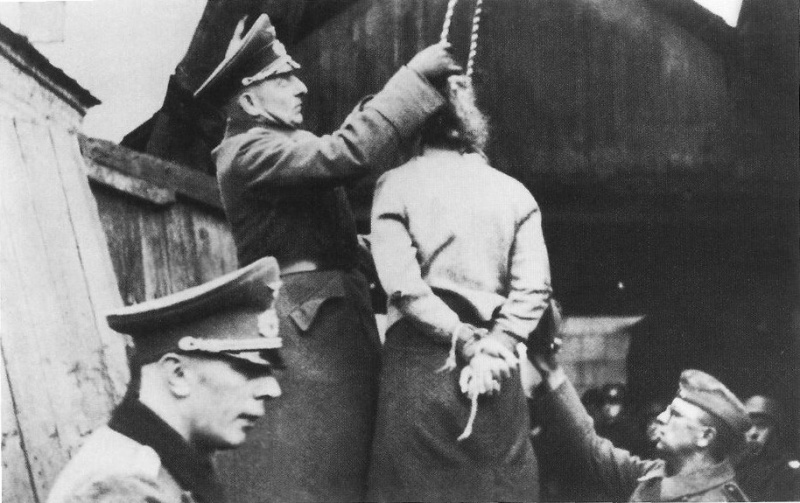
But this bastard captured her agony anyway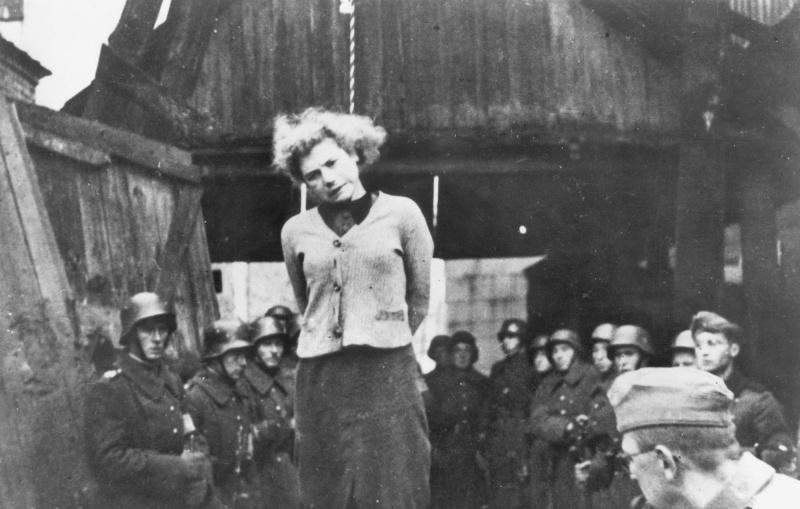
In the photo - the moment of preparation for the hanging of Vladimir Shcherbatsevich, he is only 16. On the left - the hanged 17-year-old Maria Bruskina. 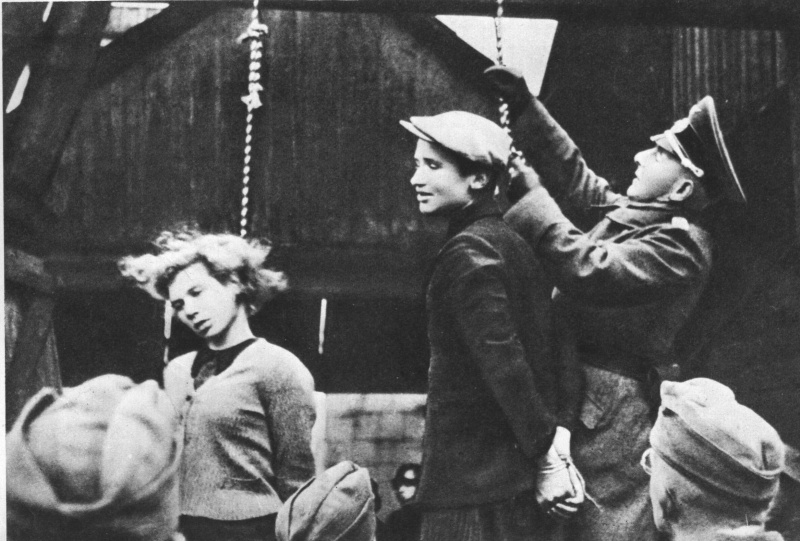
In the photo - the moment of preparation for the hanging of Kirill Trus. On the right is the executed 17-year-old Maria Bruskina. Even more to the right, the face of Vladimir Shcherbatsevich is visible. The poster reads in German and Russian: "We are partisans who fired at the German troops," although the underground members were not engaged in armed struggle against the invaders. It is possible that during the arrest, one of the underground fighters put up armed resistance, perhaps this is only a justification for the execution in front of the local population. 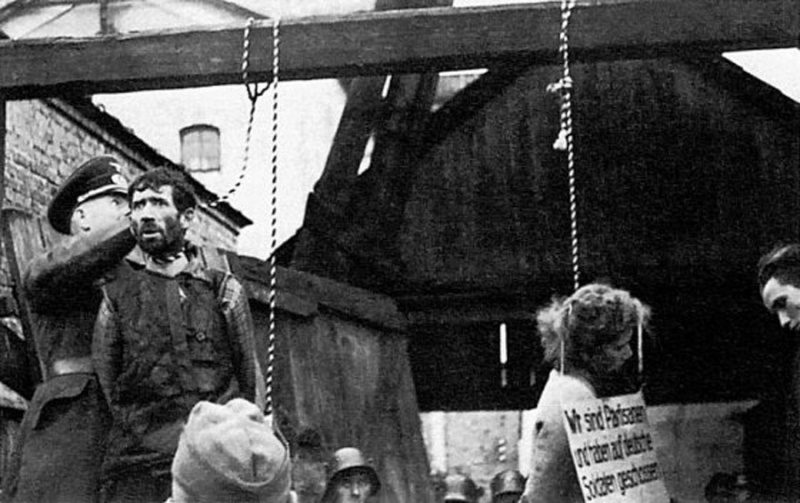
Olga Fedorovna Shcherbatsevich, an employee of the 3rd Soviet Hospital, who looked after the captured wounded soldiers and officers of the Red Army. She was hanged by the Germans in the Aleksandrovsky Park of Minsk on October 26, 1941. The inscription on the shield, in Russian and German- "We are partisans who fired at German soldiers." This is the mother of Volodya Shcherbatsevich, who was hanged on the same day, but in a different place. 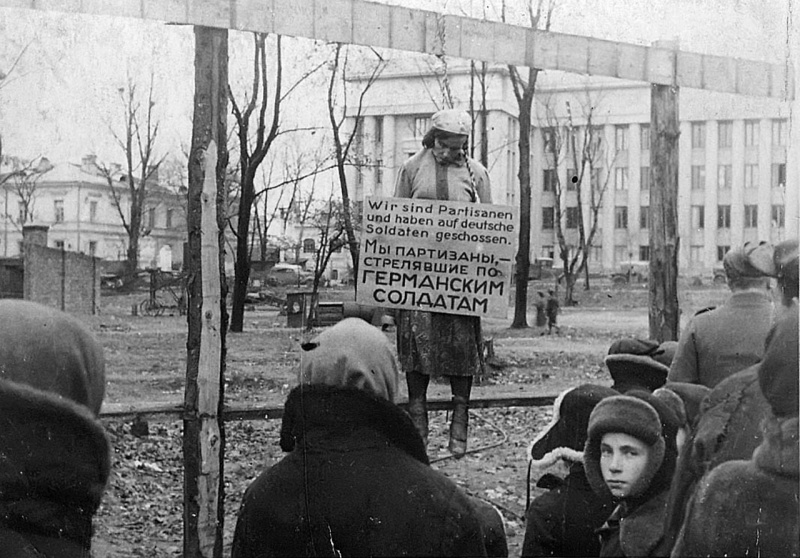
This, incidentally, is not the only "feat" of the battalion under the command of Impulavicius. In 1942 they were recruited to fight the partisans in Belarus. The German officer in command of the special operation sent the Lithuanian unit to the PPD with the words: "I need soldiers, not wild animals!"
On October 20, 1962, the Supreme Court of the Lithuanian SSR for treason, active punitive activities against Soviet citizens during the war in the occupied territory of Belarus and Lithuania, the former commander of the 12th Hitlerite punitive battalion, Major Antanas Ludwigovich Impulavichyus, and other servicemen of this battalion ... But after the war, this sadist fled to the United States and stayed for permanent residence as a "Fighter for FREEDOM".
PEOPLE'S AVENGERS. PART 7. NAZI TERROR. KILLED AND TORTURED June 23rd, 2014
Order of the commander of the 6th German Army, Field Marshal V. Reichenau on the behavior of military units in the East
On the question of the attitude of military units to the Bolshevik system, there are still unclear ideas. The main goal of the campaign against the Jewish-Bolshevik system is the complete defeat of their encircled forces and the eradication of Asian influence on European culture.
In this regard, military units are assigned tasks that go beyond the former soldier's tasks. On Eastern Front a soldier is not only a warrior according to the rules of the art of war, but also a bearer of the popular idea and an avenger for the atrocities inflicted on the Germans and their kindred peoples.
Therefore, the soldier must have complete concept about the need for a strict but fair punishment for the Jewish scum of humanity. The further task is destroy in the bud uprising in the rear of the army, which, according to experience, are always started by Jews (1).
The fight against the enemy in the rear is being conducted so far with insufficient seriousness. They still continue to qualify insidious, cruel partisans and depraved women as prisoners of war. They continue to view armed adolescents and vagrants dressed in semi-civilian and civilian clothes as decent soldiers and put them in prisoner of war camps. Yes, captured Russian officers, laughing sarcastically, say that Soviet agents freely walk the streets and often eat in German field kitchens. This behavior of military units can only be explained by complete thoughtlessness. It is time for the bosses to clarify the meaning of this struggle.
Giving food to the local population and prisoners of war who do not work for the German army, using military kitchens, is as erroneous humanity as giving bread and cigarettes. What the homeland refuses, the leadership brings here with great difficulties, the soldier should not give the enemy, even if it is a trophy. This is an essential part of our supply.
During their retreat, the Soviets often set fire to buildings. Military unit only so interested in extinguishing, because buildings must be preserved for their placement. Otherwise, the disappearance of the symbols of the former Bolshevik government, also in the form of buildings, is included in the program of the war of destruction. Neither historical nor artistic considerations play any role in this in the East.
The leadership will give the necessary instructions on obtaining military-economically important raw materials and products.
Complete disarmament of the population in the rear of active units, taking into account the long and dangerous supply routes, is urgent need... Where possible, trophy weapons and ammunition should be collected and guarded. If military circumstances make this impossible, then weapons and ammunition must be rendered unusable. If it is established that partisans are operating in the rear of the army, then it is necessary to act with draconian measures... This should also be extended to the male population, which could cause harm. Numerous elements, supposedly hostile to the Soviets, who take a wait and see attitude, need to be persuaded to actively cooperate against Bolshevism. Otherwise, no one can then complain that he is qualified as a follower Soviet system... The fear of German countermeasures must be stronger than the threats of the wandering Bolshevik remnants.
Before all political tasks in the future, the German soldier must complete the following two tasks:
1. Complete destruction of the Bolshevik false doctrine, the Bolshevik state and its armed forces.
Merciless eradication of perfidy and atrocities, and thereby preserving the life of the German armed forces in Russia.
Only in this way will we solve our historical task and free the German people once and for all from the Asiatic-Jewish danger.
Commander-in-Chief Field Marshal von Reichenau
TsL FSB of Russia, translation from German
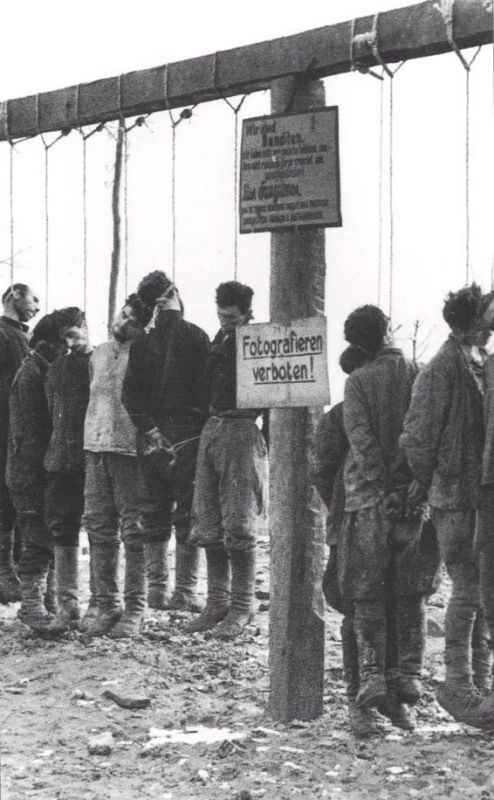
Partisans executed by the Germans
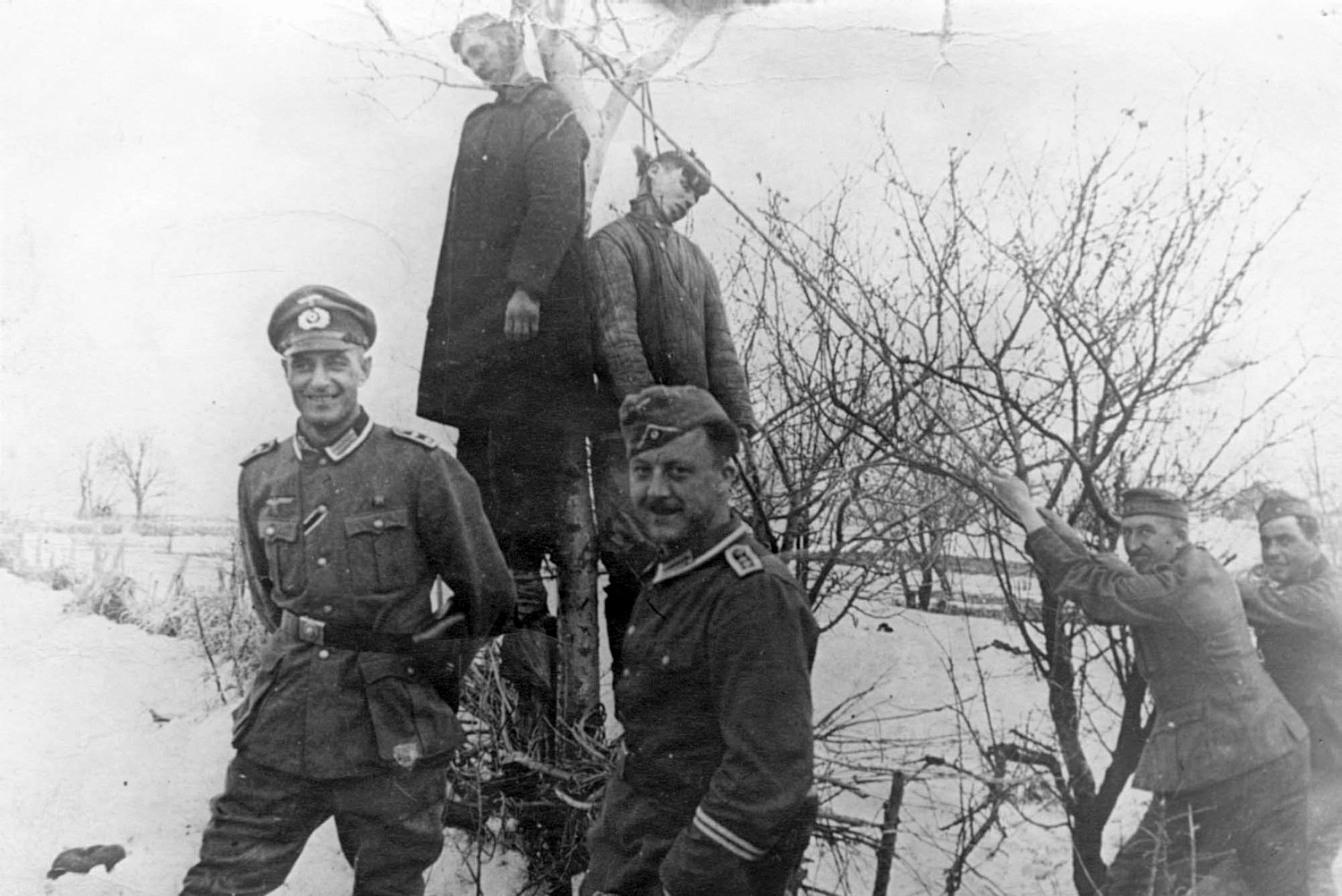
The Germans are photographed against the background of two hanged Soviet partisans
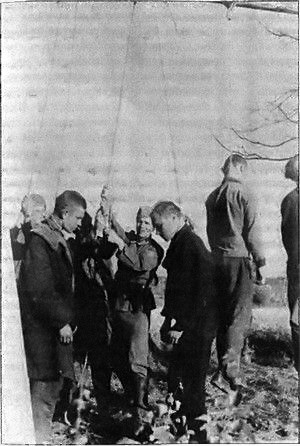
Execution. 1943
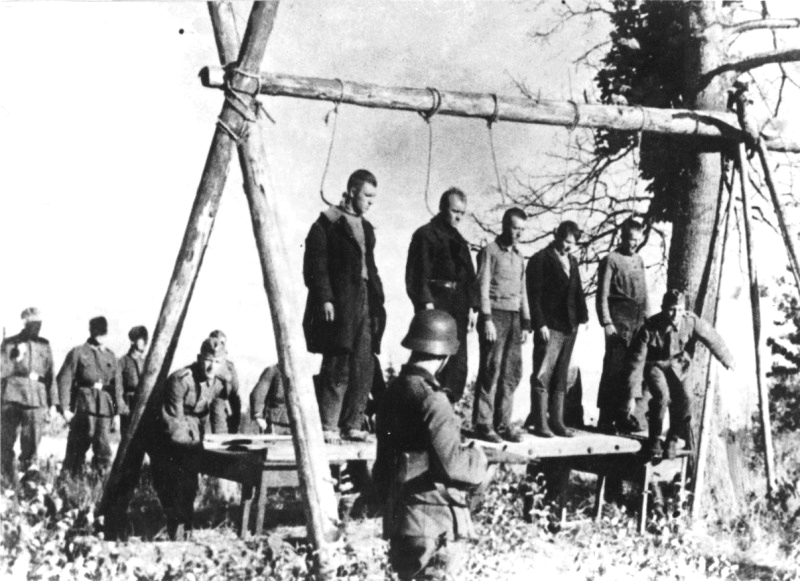
Gallows. 1941
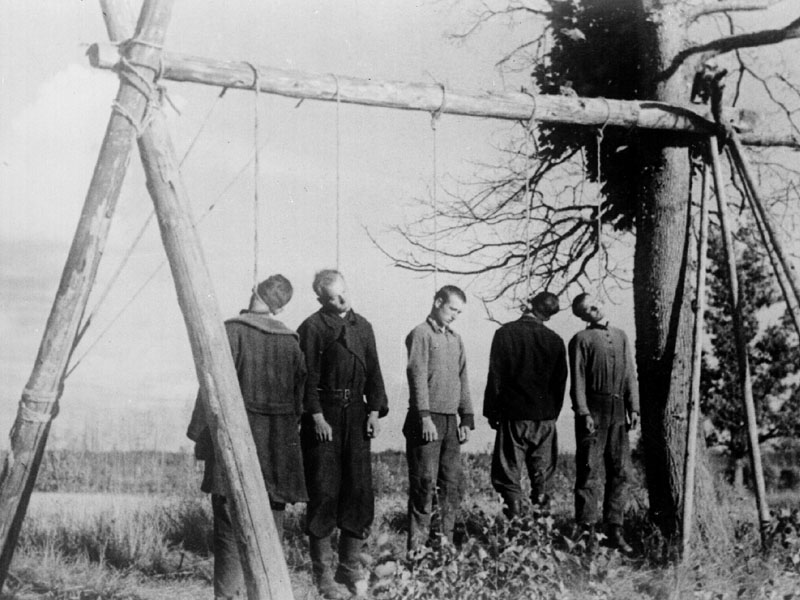
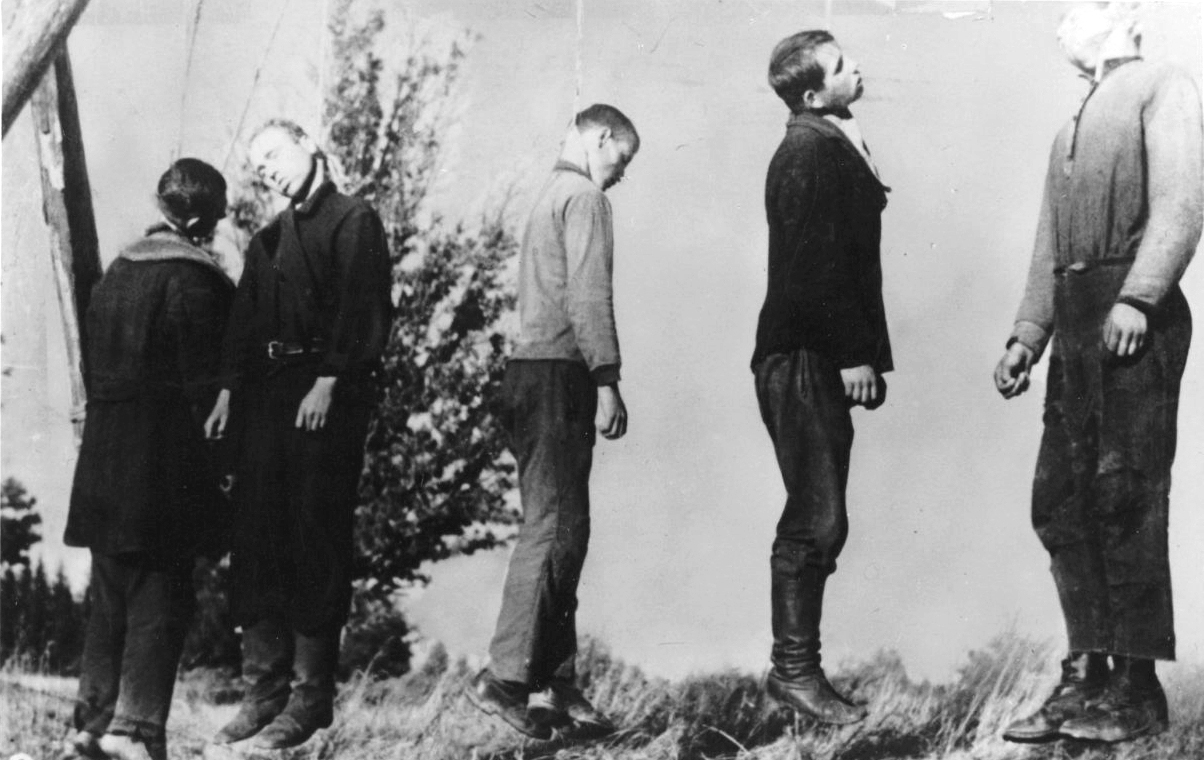
Hanged Soviet partisans. 1941
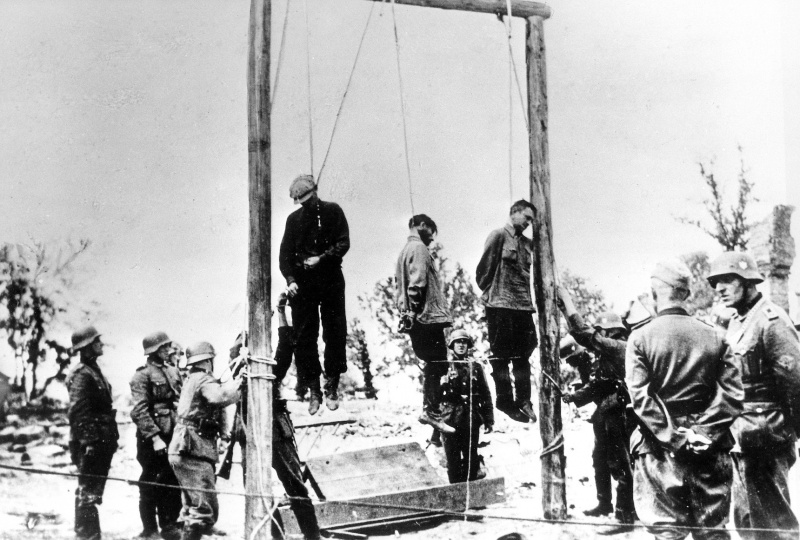
Hanged Soviet citizens suspected by the Germans in connection with the partisans. 1941
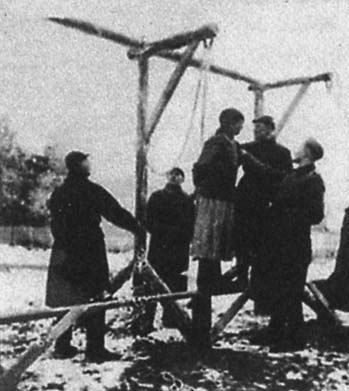
Excerpt from memo Head of the NSDAP Party Chancellery, Reichsleiter Martin Bormann of 16/07/1941 on the partisan war and the future German occupation policy in the East
Fuehrer's rate,
16.7.1941
Bo / Fu
Secret
Memo
By order of the Fuehrer, today, at 15 o'clock, he had a meeting with Reichsleiter Rosenberg, Reichsminister Lammers, Field Marshal Keitel, Reichsmarschall and me. [...] At the beginning, the Fuehrer said that he wanted to emphasize the main thing. [...] It's all about dividing the huge pie fairly so that we can, firstly, keep it, secondly, manage it, and thirdly, exploit it. The Russians gave the order to start in our rear guerrilla warfare... But this war has its positive side - it gives us the opportunity to eradicate everything that is against us. [...]
Reichsleiter Rosenberg raised the issue of guarding the administration. The Fuehrer says that [...] he always insisted on the transfer of armored cars to the police regiments, [...] since a police regiment, with the support of an appropriate number of armored cars, of course, can achieve great success. For the rest, the Fuehrer stressed, the security is, of course, very weak. [...] Over a vast area, pacification should be carried out as quickly as possible; this is best achieved by shooting everyone who looks askance... Field Marshal Keitel stressed that residents need to be made to bear responsibility for their affairs, since it is impossible to put up guards at every barn and every station. The population should know that anyone who does not work will be shot and that anyone will be held accountable for the slightest offense.
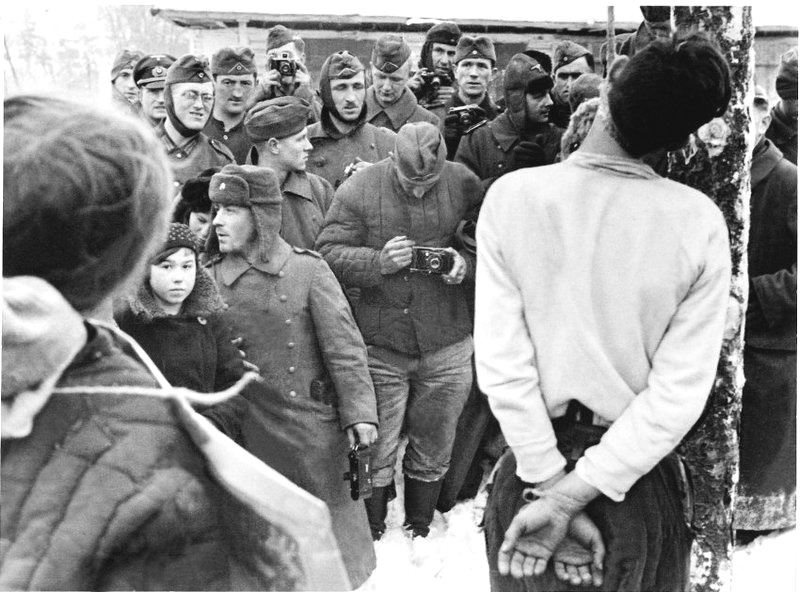
The execution of the partisan. THE USSR. Winter 1941-42. Bundesarchiv
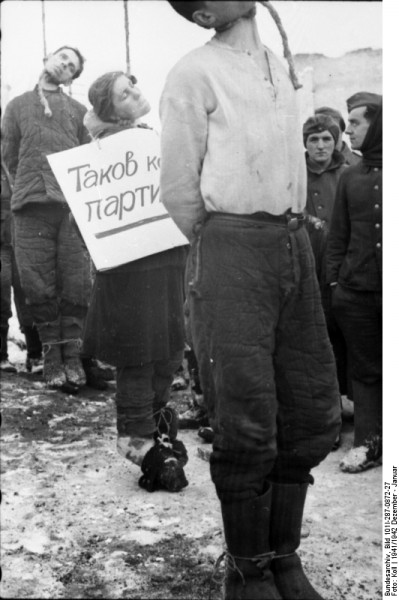
Partisans hanged in the Oryol area
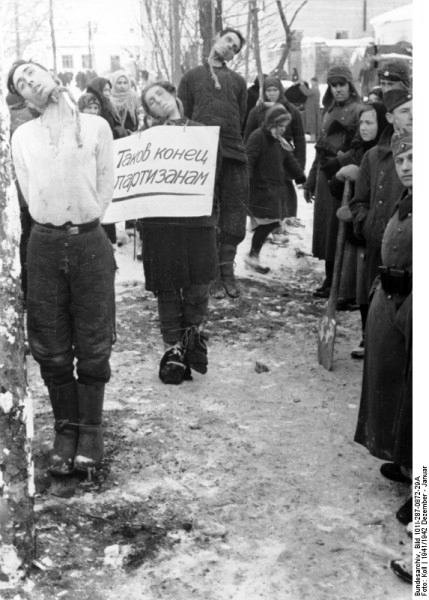
To the photo above
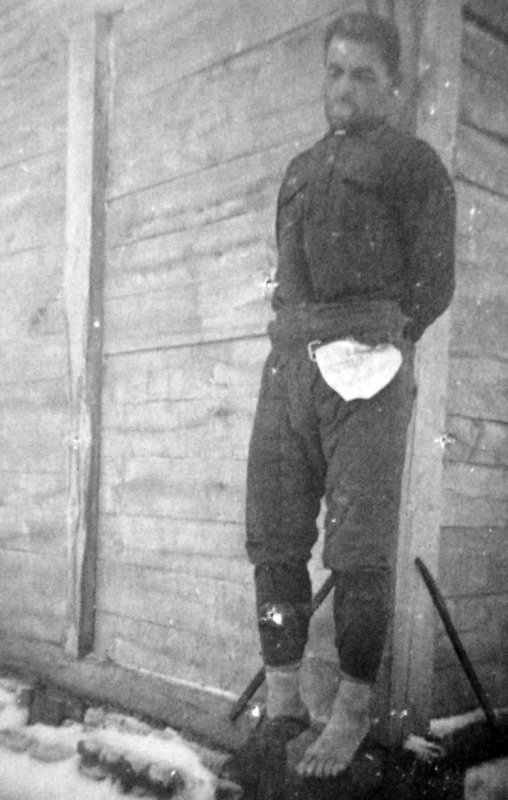
Hanged by the Germans at the corner of the house Soviet partisan
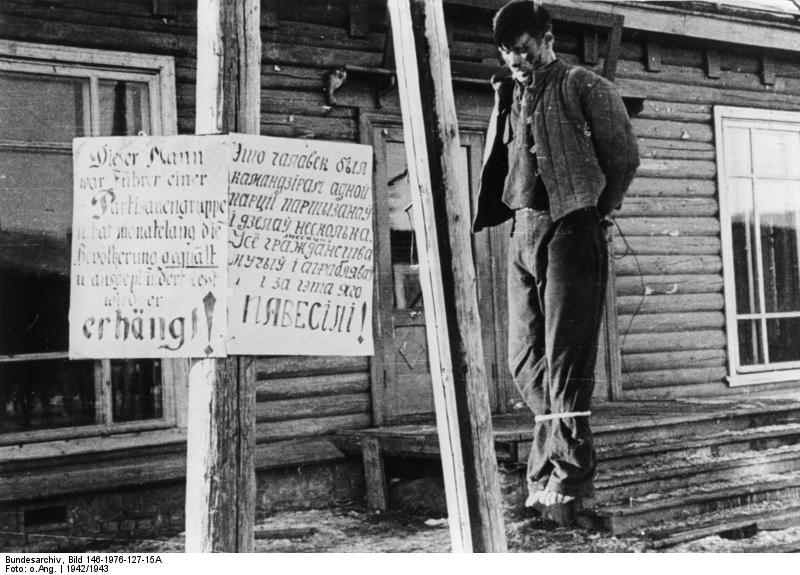
Belarusian partisan
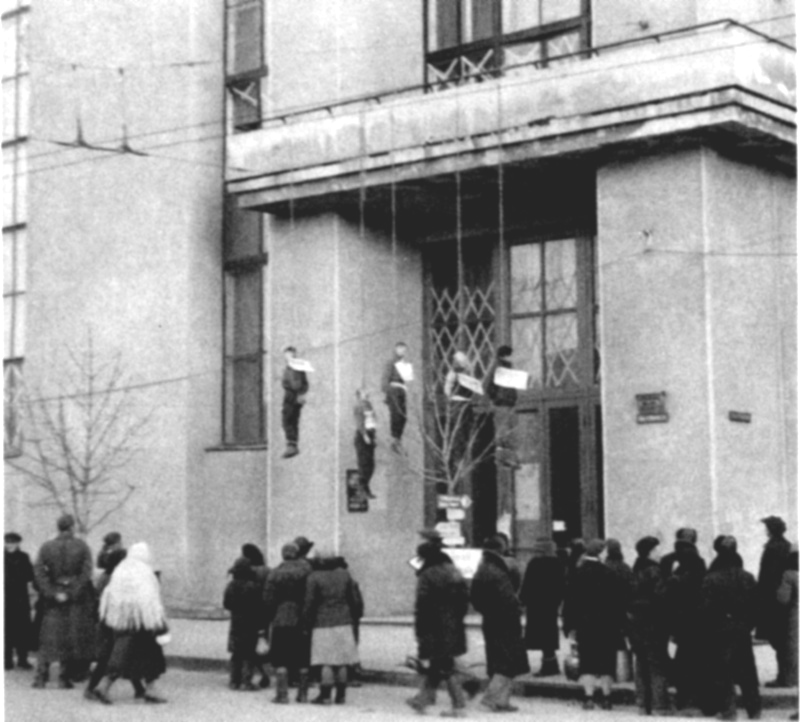
Soviet partisans hanged on the balcony of an administrative building in Kharkov
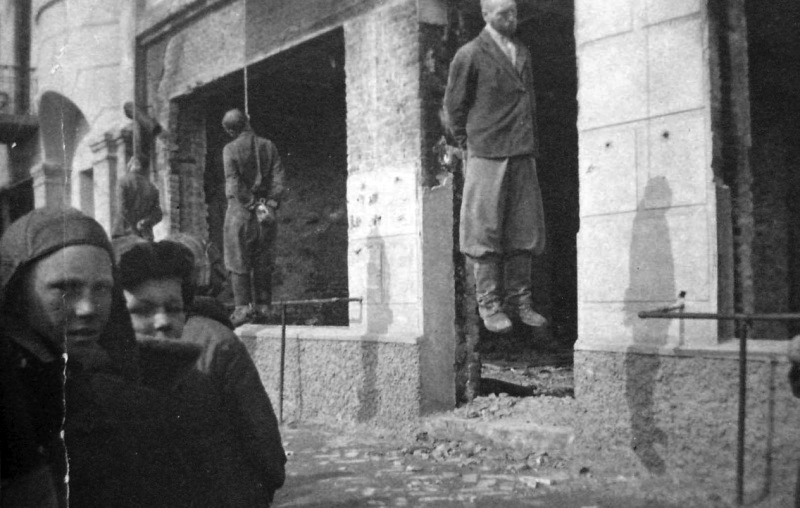
Residents of Kharkov at the bodies of three Soviet partisans hanged on Shevchenko Street. 1942
Letter from the Chief of the General Staff of the 6th Army to the Süd Group of Forces dated December 7, 1941 about the fight against the partisans
Group of Forces Süd
In the disposition of the army, the partisan movement can be considered suppressed. The army attributes this to the strict measures that were applied.
The threat to the population to take away all food and to burn down the villages, if they did not promptly report the whereabouts of the partisans, was a complete success. Along with the real partisans, many elements that were in the district without documents were eliminated, among which agents and liaison partisans were hiding.
In the course of this action, several thousand were publicly hanged and shot at the location of the army. Experience shows that execution by hanging is particularly frightening. Several hundred partisans and suspicious elements were hanged in the city of Kharkov. From that time on, acts of sabotage ceased.
Experience has shown that only those measures contribute to the achievement of the goals before which the population is experiencing greater fear than before the terror of the guerrillas.
For the command of the army, the chief
general staff signature
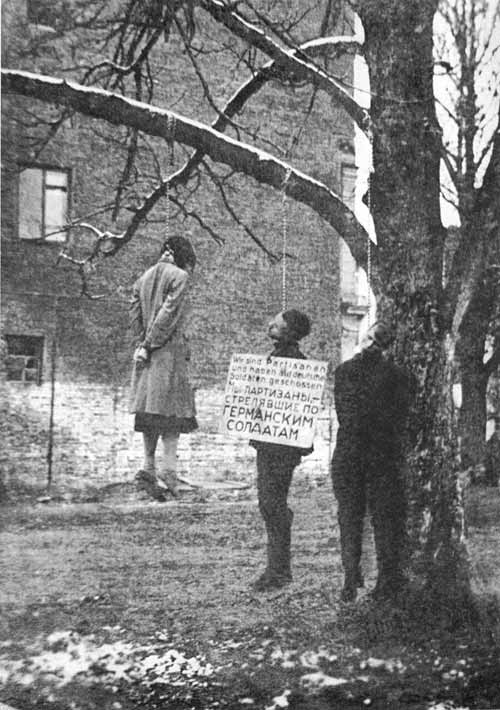
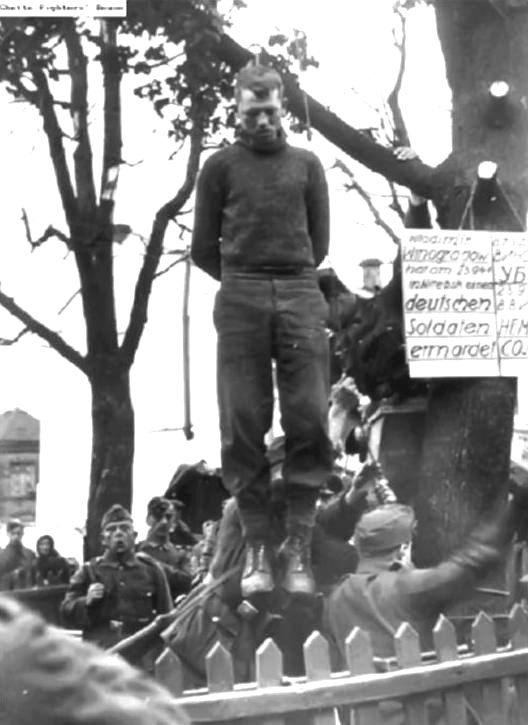
Hanging up a partisan in Vitebsk
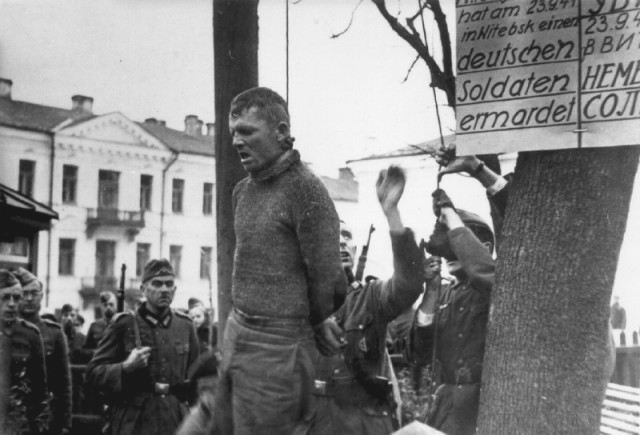
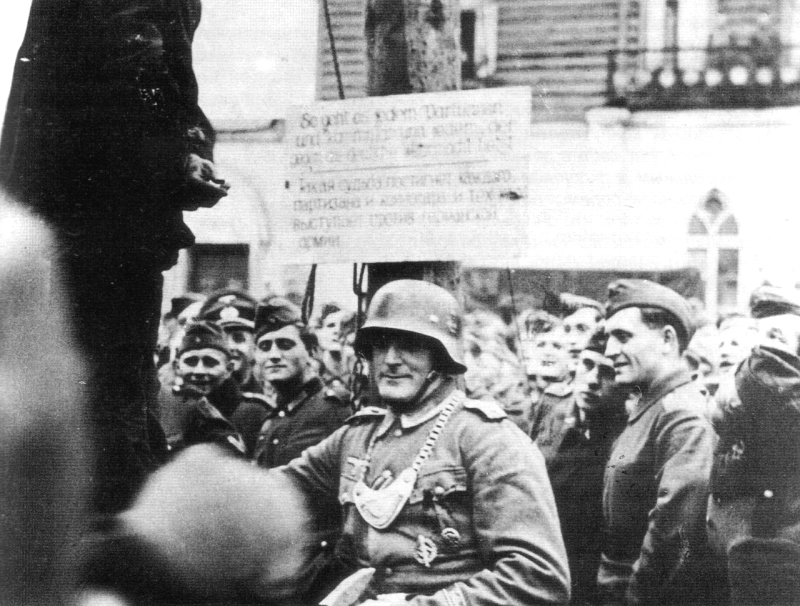
Execution of the "suspected guerrilla"
The photo was found in the personal belongings of a killed German soldier. On a board nailed to the gallows, it is written: "Such a fate will befall every partisan and commissar and those who oppose the German army."
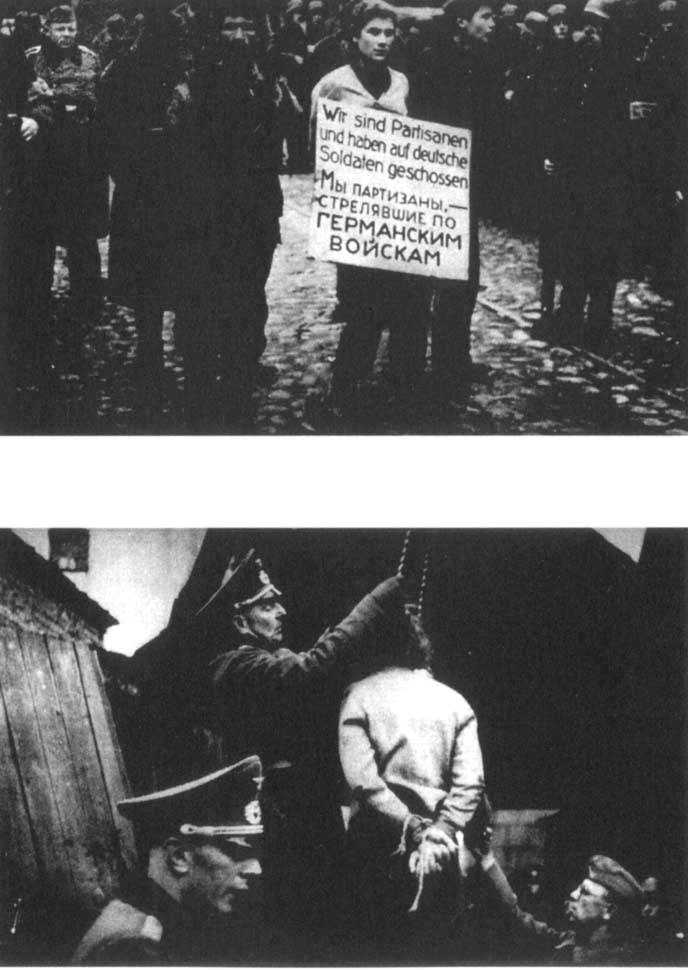
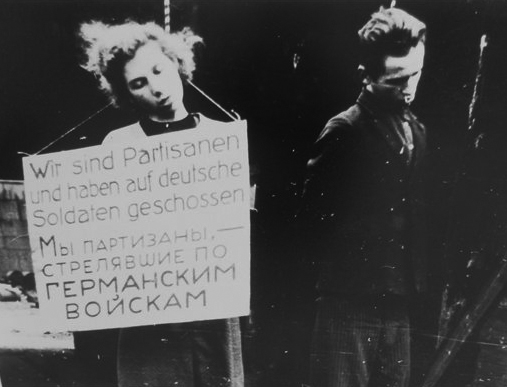
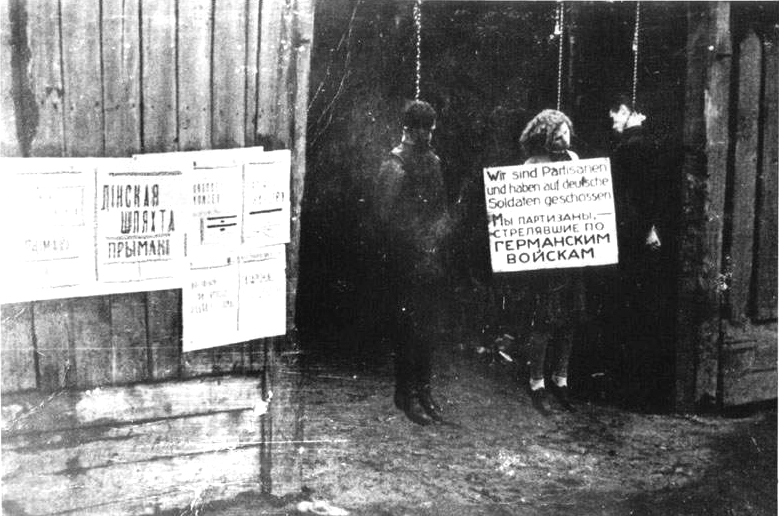
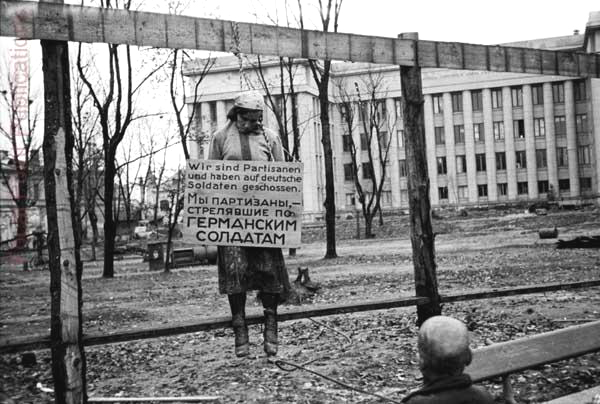
Minsk. Partisan
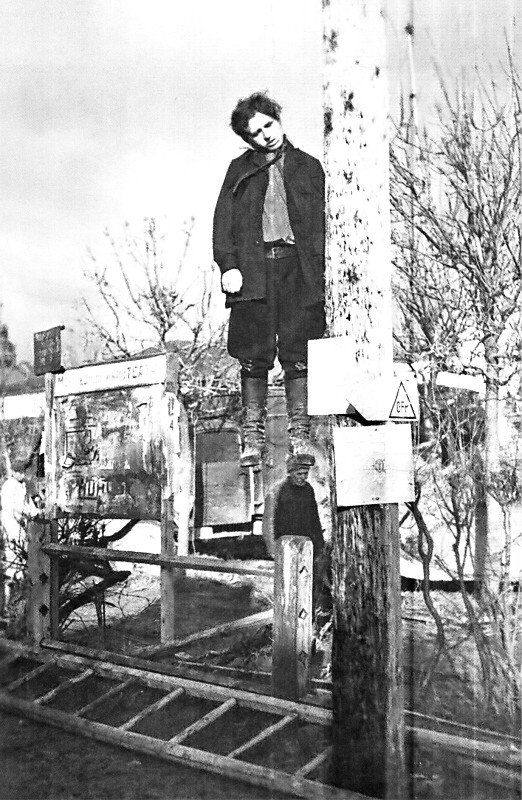
Unknown Soviet partisan hanged from a power line in the city of Mozhaisk. The inscription on the gate behind the hanged man reads "Mozhaisky cinema". The photo was found in the personal belongings of Hans Elmann, a soldier of the 10th company of the 686th regiment of the German 294th German Infantry Division (presumably), who died in battles near the village of Dmitrievka on the Mius River on March 22, 1943
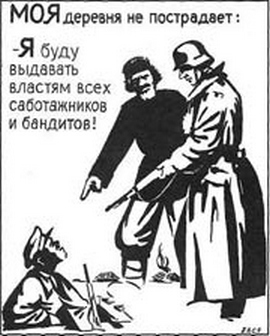
Such, here, a poster ...
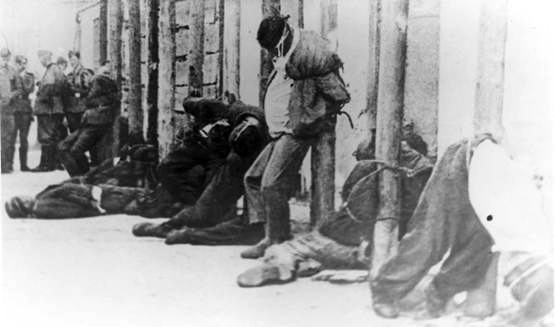
Executed partisans. Vilnius. Autumn 1941
On October 26, 1941, the Nazis staged the first public execution in Minsk. 10 people sentenced for communication with partisans were taken out of the prison. Among the killed underground workers was Maria Bruskina, who had just finished school before the war. She, on instructions from the underground, got a job in an infirmary, and helped the wounded Soviet soldiers run to the partisans, made fake German documents using a camera, for the possession of which the Nazis sentenced to death penalty... The girl was arrested on a denunciation, and before the execution was led through the streets of the city with a plywood shield around her neck, on which was the inscription in German and Russian "We are partisans who fired at the German troops."
In the Minsk Museum of the Great patriotic war there are 30 photos from that terrible execution... The Nazis coolly filmed the entire murder process. These photographs were witnesses for the prosecution on Nuremberg trials... They were presented to the world by Mikhail Romm in the film "Ordinary Fascism"; they were included in all multivolume publications about the war. Belarusian documentary filmmakers also turned to photographs, in 1967 Vitaly Chetverikov shot the film “Executed in 1941” about the people depicted on them.
but Nuremberg Tribunal Having recognized such organizations as the SS security service and the Nazi party as criminal, he decided that soldiers who carried out other people's orders should not be punished, and the Wehrmacht turned out to be whitewashed - for many years the Germans believed that while the SS men destroyed Jews and burned villages, the Wehrmacht soldiers fought honestly and nobly with soldiers of the enemy equal to themselves and died in battle, without staining their hands with the blood of civilians.
However, in 1997 this myth was debunked - the Hamburg Institute for Sociological Research organized a traveling exhibition "Crimes of the Wehrmacht", which included about a thousand photographs depicting the execution and torture of Soviet people, including photographs from the Minsk museum. This exhibition aroused great interest, everyone wanted to see with their own eyes how everything really happened. In the first three days alone, the exposition was visited by 100 thousand people.
 In the photo: Annegrit Aichhorn. When one of the visitors became ill and she lost consciousness, no one was surprised - there were a lot of people in the exhibition hall, it was stuffy, no wonder that an elderly woman did not have enough oxygen. However, in fact, 60-year-old popular journalist Annegrit Aichhorn fell from shock - in one of the photographs she saw her father throwing a noose around the neck of the underground worker Masha Bruskina, and after all, this woman considered her father an ordinary honest soldier who worked before the war. journalist, and in whose footsteps she herself came into the profession.
In the photo: Annegrit Aichhorn. When one of the visitors became ill and she lost consciousness, no one was surprised - there were a lot of people in the exhibition hall, it was stuffy, no wonder that an elderly woman did not have enough oxygen. However, in fact, 60-year-old popular journalist Annegrit Aichhorn fell from shock - in one of the photographs she saw her father throwing a noose around the neck of the underground worker Masha Bruskina, and after all, this woman considered her father an ordinary honest soldier who worked before the war. journalist, and in whose footsteps she herself came into the profession.
A few days later, Annegrit gave an interview to her friend, which was published in the daily newspaper Süddeutsche Zeitung under the headline “My father, a war criminal”. Not everyone in society unambiguously perceived the daughter's emotional revelations; friends, acquaintances and even relatives attacked her with accusations. Annegrit was already not easy to survive the accidental discovery, and these attacks did the job, and, in the end, the journalist could not stand the internal contradictions and accusations of society and committed suicide.
But the Belarusian documentary filmmaker Anatoly Alai conducted his own investigation, and claims that the German woman died in vain - the woman identified herself, and her father, Karl Scheidemann, is not the person who hung up the underground:
I was very impressed by the story of the German journalist and started to conduct my own investigation. I was alarmed by the fact that Karl Scheidemann was captured in only one photo. After a year of work, travel and meeting people, I collected 11 folders with letters, archival materials, interviews, and found out that Karl Scheidemann did not hang Masha Bruskin. The executioner was another officer, according to my assumptions a Lithuanian, whose identity I have yet to establish. I made the film "Boomerang" about this story, and now I am preparing its second part, because I managed to find out that Scheidemann kept a diary during the war, which survived and is now kept by his granddaughters. I hope they will allow me to familiarize myself with it.
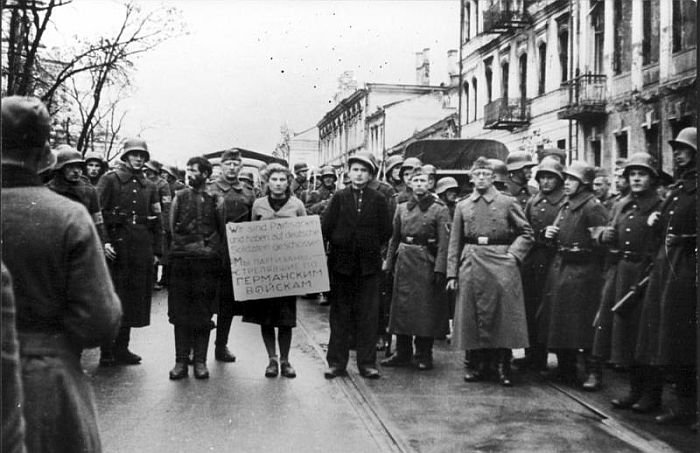 Three underground fighters (in the center of Masha Brusnikin) are led to execution
Three underground fighters (in the center of Masha Brusnikin) are led to execution
Yes, I understand that the topic is slippery - I seem to be justifying a person who, perhaps, committed atrocities no less terrible than what was recorded in the fatal photograph. But I believe that you cannot judge everyone indiscriminately, and the establishment of reliable historical facts first of all, it is important to create a complete picture of what is happening during the war. And I do all this in memory of my father, Ivan Alai, who died during the war, and whose traces I still hope to find.
![]() In the photo, the alleged Karl Scheidemann, throws a noose around Masha Bruskina's neck
In the photo, the alleged Karl Scheidemann, throws a noose around Masha Bruskina's neck
And the fate of Masha Bruskina, even after her death, was unfair to the brave underground worker. In the wake of Soviet anti-Semitism, the memory of Masha, who was Jewish and the niece of the famous Belarusian sculptor Zaire Azgur, was not perpetuated in Belarus for many years. All the requests of historians and ethnographers were lost in bureaucratic corridors, while in Minsk there have long been streets named after Masha's comrades-in-arms who died with her - Kirill Trus and Olga Shcherbatsevich. Having decided not to wait for favors from the Belarusian authorities, a street in Jerusalem was named after Masha Bruskina. And only in 2009, a memorial sign was erected at the entrance of the Minsk yeast plant, at the place of execution of Masha and her comrades, where her surname is also mentioned.
What else to read
THE LAST NOTES
- Princess Olga's trip to Constantinople
- Why jeans are always in fashion Why jeans are so popular
- Essential oils: useful properties and contraindications, how to use Is essential oil harmful?
- Scarf: the history of fashion in a strip of fabric Women's silk scarf its history
- Peregrine falcon bird: description and photo How the peregrine falcon relates to people
